South Africa Travel Guide
South Africa Travel Guide – prepare your trip to South Africa with our practical guide: where to go, what to do, food, rooftops, how to get around, safety and more.
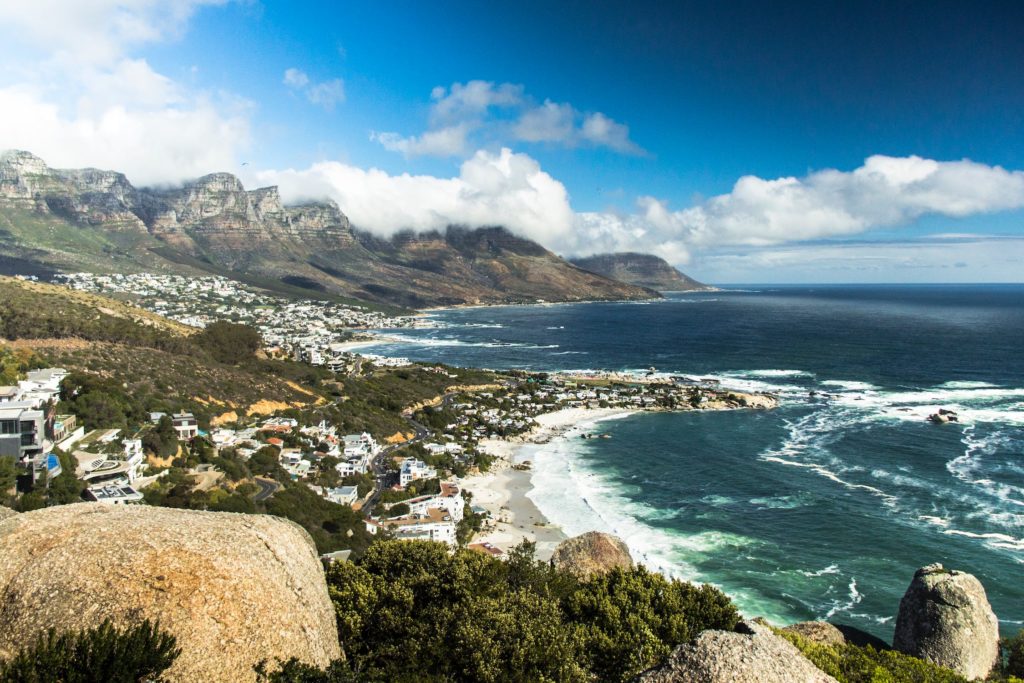
Welcome to South Africa, a country of breathtaking landscapes, diverse wildlife, and vibrant cultures. Nestled at the southernmost tip of the African continent, South Africa is a captivating destination that offers a wealth of experiences for every traveler. From the iconic Table Mountain in Cape Town to the vast savannahs of Kruger National Park, this country is a paradise for nature enthusiasts. Whether you’re seeking thrilling safari adventures, exploring picturesque coastlines, or immersing yourself in the rich history and heritage, South Africa has it all.
Travel to South Africa
One of the highlights of South Africa is its incredible wildlife. With numerous national parks and private game reserves, you can embark on unforgettable safari tours and witness the “Big Five” (elephants, lions, rhinos, leopards, and buffalo) in their natural habitats. Kruger National Park, one of Africa’s largest game reserves, is a must-visit destination for wildlife enthusiasts. You can also visit Hluhluwe-iMfolozi Park, famous for its conservation efforts and successful rhino breeding programs. Exploring these parks will give you a chance to encounter a diverse array of animals, including giraffes, zebras, cheetahs, and countless bird species.
Beyond its natural wonders, South Africa boasts a rich cultural tapestry. The country is a melting pot of various ethnicities, and each group contributes to its vibrant heritage. In cities like Cape Town, Johannesburg, and Durban, you can experience a fusion of cultures, art, and cuisine. Immerse yourself in the history of the nation by visiting Robben Island, where Nelson Mandela was held captive for 18 years. Don’t miss the opportunity to explore the colorful Bo-Kaap neighborhood in Cape Town, renowned for its vibrant houses and Cape Malay culture. You can also indulge in a culinary adventure, sampling the diverse flavors of South African cuisine, which blends African, European, and Asian influences.
South Africa’s natural wonders, wildlife, and cultural diversity make it a dream destination for any traveler. With its warm and welcoming people, you’ll be embraced by the spirit of Ubuntu (humanity) wherever you go. Whether you’re exploring the dramatic landscapes of the Drakensberg Mountains, venturing along the scenic Garden Route, or sipping world-class wines in the Cape Winelands, South Africa promises an unforgettable journey filled with beauty, adventure, and a deep connection to the wonders of this remarkable country.
when is the best time to go to South Africa – what are the 4 seasons like in South Africa
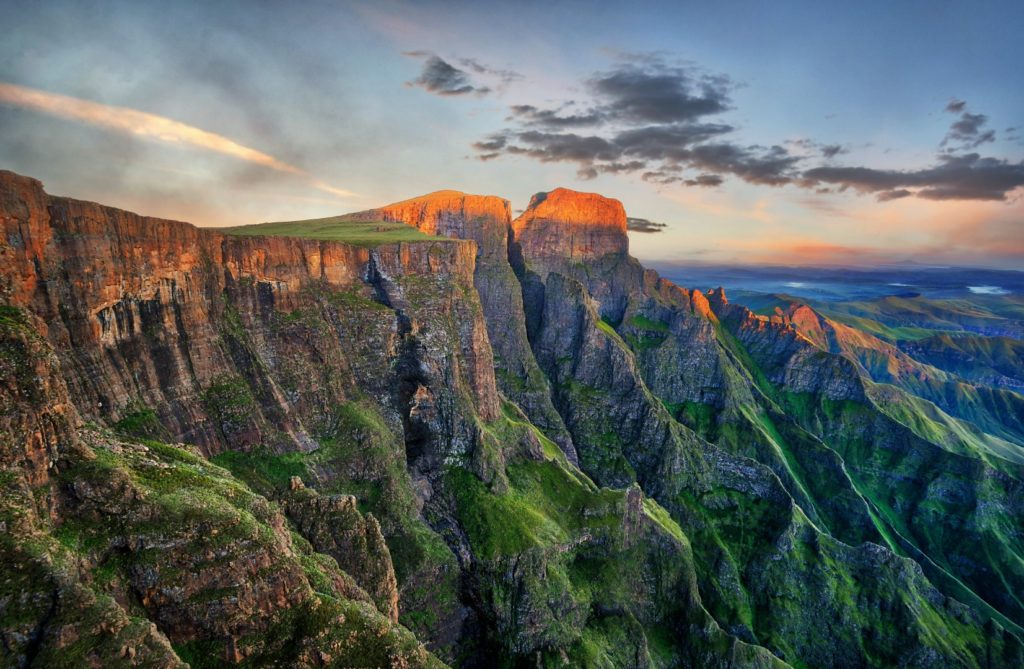
Entry and visa requirements
Visa requirements for South Africa may vary depending on your nationality. However, I can provide you with some general information. Please note that immigration policies can change, so it’s essential to check with the South African embassy or consulate in your country for the most up-to-date information.
For American citizens, if you are planning a short-term visit for tourism or business purposes, you generally do not need a visa for stays up to 90 days. However, it is important to have a valid passport with at least two blank pages and six months’ validity beyond your intended departure date.
For European Union (EU) citizens, including those from countries participating in the Schengen Agreement, no visa is required for short-term tourist visits of up to 90 days within a 180-day period. Again, a valid passport meeting the entry requirements is necessary.
For nationals of other countries, including non-EU European countries, visa requirements may apply. It is advisable to check with the South African embassy or consulate in your country or visit the official website of the South African Department of Home Affairs for specific visa requirements and application procedures.
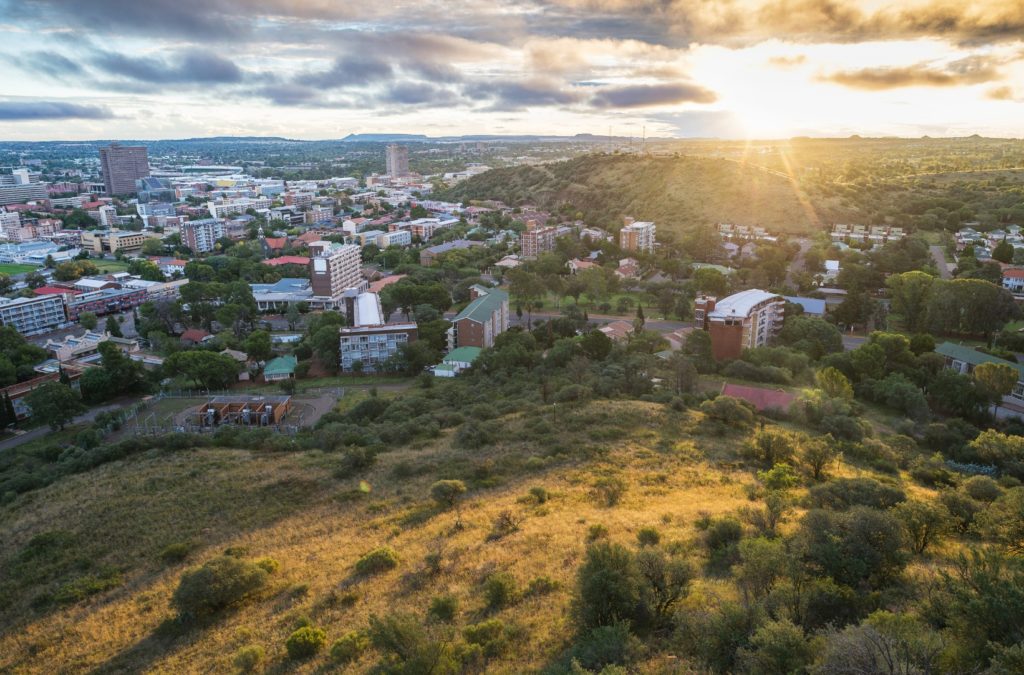
Getting around South Africa
Getting around South Africa offers various transportation options to suit your preferences and budget. Here are some common ways to travel within the country:
Domestic Flights: South Africa has several major airports, including O.R. Tambo International Airport in Johannesburg and Cape Town International Airport. Domestic flights are a convenient and efficient way to cover long distances between cities. Airlines like South African Airways, Mango, and Kulula offer regular domestic flights to various destinations.
Car Rental: Renting a car gives you the flexibility to explore South Africa at your own pace. Many reputable car rental companies operate in major cities and airports. Be sure to have an international driver’s license and check the driving regulations and road conditions before embarking on your journey. South Africa has a good network of well-maintained roads, and self-driving allows you to venture into more remote areas and scenic routes.
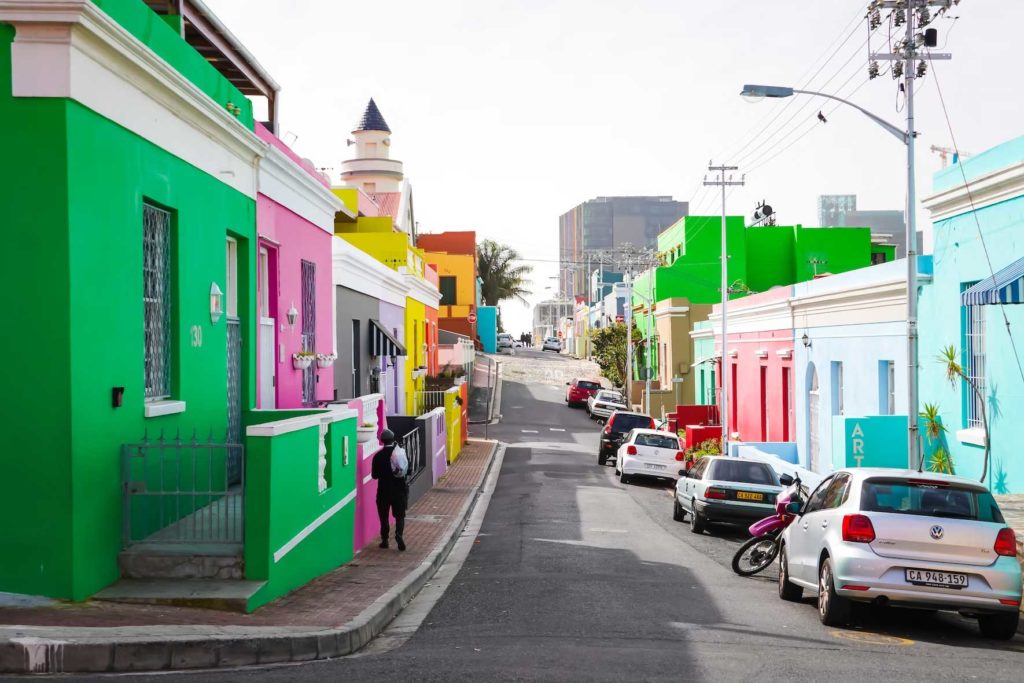
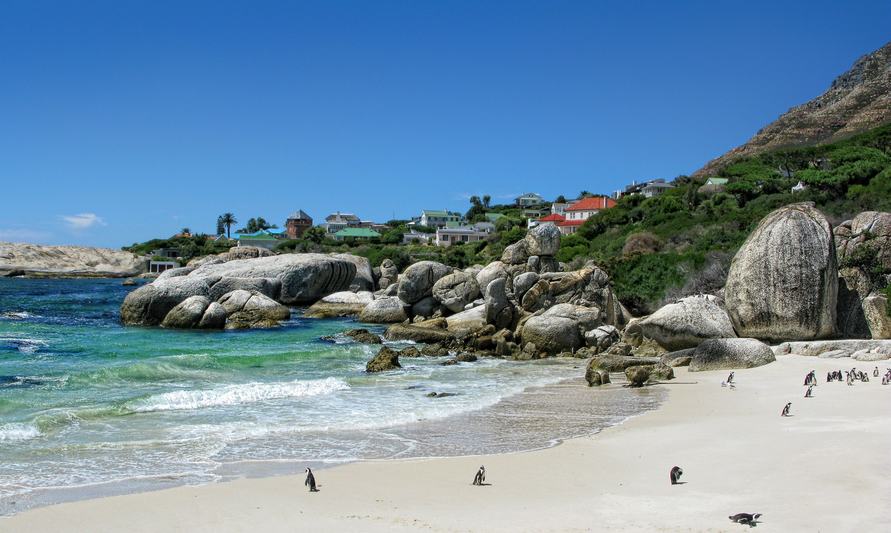
Inter-City Buses: South Africa has an extensive network of inter-city buses, making it an affordable and reliable option for getting around. Companies such as Greyhound and Intercape offer comfortable bus services between major cities and towns. It’s advisable to book tickets in advance, especially during peak travel seasons.
Trains: South Africa’s rail network connects major cities, offering an alternative mode of transport. Shosholoza Meyl operates long-distance trains, including luxury options like the Blue Train and Rovos Rail, which provide scenic journeys and a unique travel experience. However, train travel can be slower than other options, so it’s important to plan accordingly.
Minibus Taxis: Minibus taxis are a common mode of transport in South Africa, particularly within cities and towns. These shared taxis can be a budget-friendly option, but they can also be crowded and operate on fixed routes. It’s essential to exercise caution, as some minibus taxis may not adhere to strict safety standards.
Uber and Taxis: Ride-hailing services like Uber operate in major cities, providing a convenient and reliable means of transportation. Traditional metered taxis are also available, but it’s advisable to negotiate the fare in advance or ensure that the meter is used.
It’s important to note that South Africa is a large country, and distances between destinations can be significant.
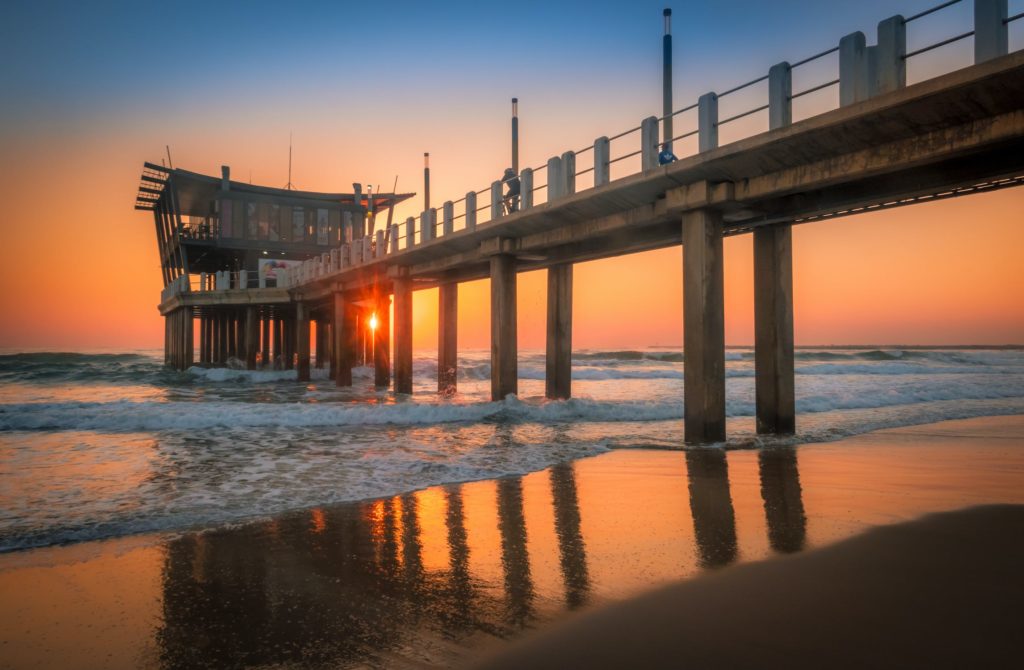
Explore South Africa’s regions
Cape Town and the Western Cape
Cape Town, the legislative capital of South Africa, is a vibrant city nestled between Table Mountain and the stunning coastline. The city offers a mix of natural beauty, historical sites, and a lively atmosphere. Must-visit attractions include Table Mountain, Robben Island, Kirstenbosch National Botanical Garden, and the colorful Bo-Kaap neighborhood. Enjoy scenic drives along the Cape Peninsula, exploring Cape Point and Boulders Beach, home to a colony of African penguins. Food enthusiasts can indulge in world-class cuisine and visit the vibrant V&A Waterfront or the trendy food markets like the Old Biscuit Mill.
Johannesburg and Gauteng
Johannesburg, the economic powerhouse of South Africa, is a bustling metropolis known for its history, art, and vibrant urban culture. Visit the Apartheid Museum and Constitution Hill to learn about the country’s past. Explore the vibrant neighborhoods of Maboneng and Braamfontein, filled with galleries, street art, and trendy cafes. Soweto, a township near Johannesburg, offers insight into the nation’s struggle against apartheid, including a visit to Nelson Mandela’s former residence. The Cradle of Humankind, a UNESCO World Heritage site, is also worth a visit, showcasing ancient fossils and archaeological sites. For dining, the city offers a wide range of culinary experiences, from upscale restaurants to lively street food markets like Neighbourgoods Market and 44 Stanley.
Durban and KwaZulu-Natal
Located on the east coast, Durban is a coastal gem known for its warm weather, beautiful beaches, and cultural diversity. Explore the Golden Mile, a bustling promenade lined with shops, restaurants, and entertainment options. Don’t miss uShaka Marine World, an expansive aquarium and water park. Immerse yourself in Zulu culture at the Shakaland Cultural Village or visit the Valley of a Thousand Hills for stunning views and cultural experiences. Food lovers can savor Durban’s famous Indian cuisine, with a variety of flavors and spices, including the iconic bunny chow, at popular spots like the Victoria Street Market.
These descriptions only scratch the surface of what South Africa has to offer. Each region is filled with unique attractions, natural wonders, and cultural experiences that showcase the diversity and beauty of the country. Whether you’re exploring the wildlife-rich Kruger National Park, the scenic Garden Route, the picturesque Winelands of Stellenbosch and Franschhoek, or the dramatic landscapes of the Drakensberg Mountains, South Africa promises a journey of discovery and adventure.
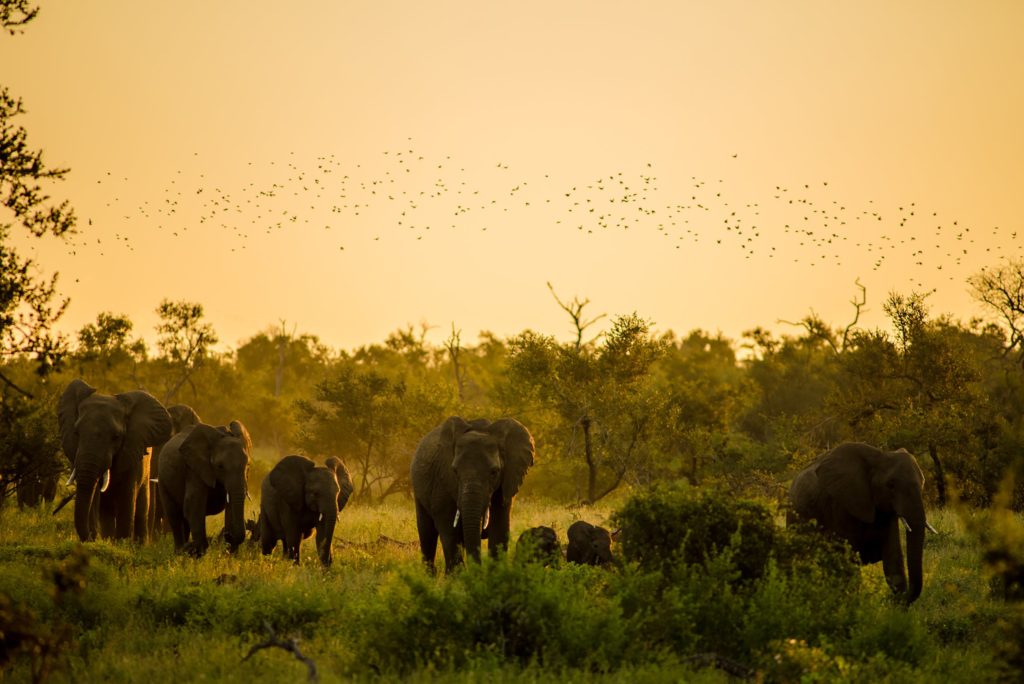
Explore South Africa’s main cities
Cape Town
Situated at the southwestern tip of South Africa, Cape Town is a captivating city that offers a blend of natural beauty, cultural attractions, and a vibrant atmosphere. The iconic Table Mountain stands tall as a prominent landmark, offering breathtaking views of the city and the coastline. Explore the historical Robben Island, where Nelson Mandela was imprisoned, and delve into the city’s history at the District Six Museum. Enjoy the vibrant V&A Waterfront, bustling with shops, restaurants, and entertainment. For beach lovers, there are pristine stretches of sand, such as Camps Bay and Clifton, perfect for soaking up the sun. Don’t miss the chance to embark on a scenic drive along the Cape Peninsula, visiting Cape Point and the charming penguin colony at Boulders Beach.
Johannesburg
Known as the economic hub of South Africa, Johannesburg is a dynamic city that offers a glimpse into the country’s history and urban culture. Explore the Apartheid Museum and Constitution Hill to gain insights into South Africa’s past struggles and triumphs. Discover the vibrant neighborhood of Maboneng, with its art galleries, trendy cafes, and markets. For a taste of nature, visit the Johannesburg Botanical Garden or take a trip to the nearby UNESCO World Heritage site, the Cradle of Humankind, home to ancient fossils and archaeological wonders. The buzzing suburb of Soweto provides a cultural experience, showcasing the township’s history, vibrant street life, and a visit to Nelson Mandela’s former residence.
Pretoria
Pretoria, the administrative capital of South Africa, is a city steeped in history and adorned with stunning architecture. The city is known for its iconic Union Buildings, which house the offices of the South African government and offer breathtaking views of the city. History enthusiasts can explore the fascinating Voortrekker Monument, a tribute to the Afrikaans pioneers, and the Paul Kruger House Museum, showcasing the life of the former South African president. The Pretoria National Botanical Garden is a picturesque retreat, perfect for leisurely walks and enjoying the beautiful flora. With its blend of historical landmarks, beautiful gardens, and a relaxed atmosphere, Pretoria offers a captivating experience for visitors.
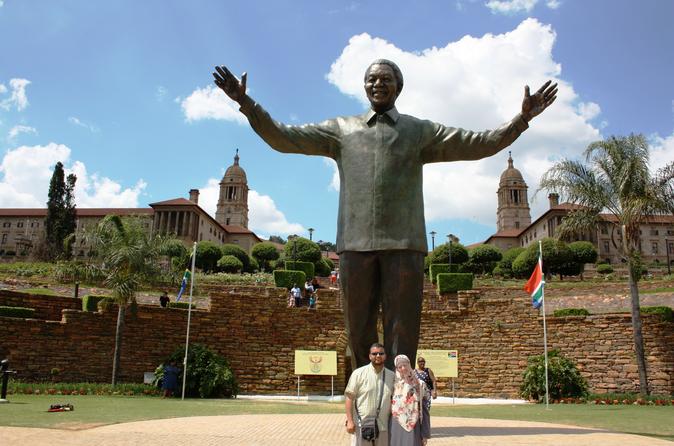
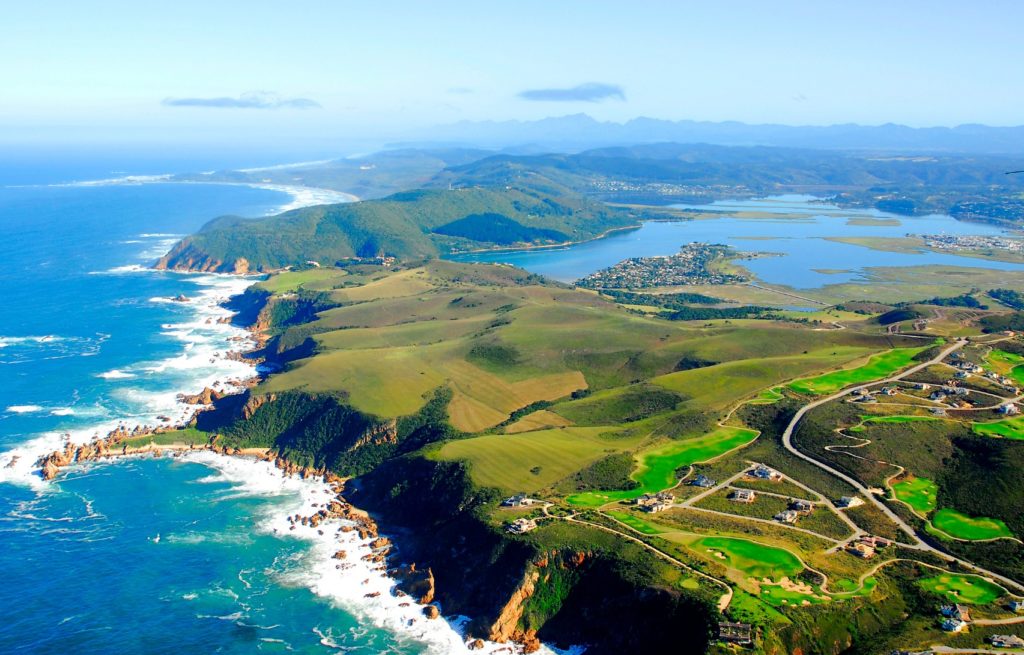
Durban
Located on the east coast, Durban is a vibrant city known for its golden beaches, multiculturalism, and warm climate. Enjoy the lively atmosphere of the Golden Mile, a beachfront promenade filled with shops, restaurants, and entertainment. Dive into the marine world at uShaka Marine World, a massive aquarium and water park that promises fun for all ages. Immerse yourself in Zulu culture at the Shakaland Cultural Village or explore the Valley of a Thousand Hills for breathtaking views and cultural experiences. Food enthusiasts can indulge in Durban’s renowned Indian cuisine, from spicy curries to delicious bunny chow, while markets like the Victoria Street Market offer a feast for the senses.
Port Elizabeth
Port Elizabeth, also known as PE, is a coastal city located in the Eastern Cape province of South Africa. Known for its beautiful beaches, pleasant climate, and friendly atmosphere, Port Elizabeth offers a range of attractions and activities for visitors to enjoy. The city serves as a gateway to the renowned Garden Route, making it an ideal starting point for exploring the scenic coastal stretch. One of the main landmarks in Port Elizabeth is the iconic Donkin Reserve, named after Sir Rufane Donkin, who founded the city. Here you can find historical buildings, a lighthouse, and a pyramid-shaped monument dedicated to Donkin’s late wife, Elizabeth. Take a leisurely stroll along the Donkin Heritage Trail, which showcases significant cultural and historical sites. Port Elizabeth is also known for its stunning beaches, such as Kings Beach and Hobie Beach, which offer opportunities for swimming, sunbathing, and water sports. Animal lovers should visit the nearby Kragga Kamma Game Park, where you can spot a variety of wildlife, including rhinos, giraffes, and zebras.
Bloemfontein
Bloemfontein, the judicial capital of South Africa, is a charming city located in the Free State province. Known for its tranquil atmosphere and rich history, Bloemfontein offers a blend of cultural attractions and natural beauty. The city is home to the National Women’s Monument, a significant landmark commemorating the Anglo-Boer War, as well as the nearby Anglo-Boer War Museum, which provides insight into the conflict. The Free State National Botanical Garden is a serene oasis where visitors can explore beautiful gardens and enjoy picnics. Additionally, the Naval Hill Nature Reserve offers panoramic views of the city, along with a statue of Nelson Mandela. Bloemfontein is also renowned for its annual Rose Festival, celebrating the city’s collection of exquisite roses. With its historical sites, scenic parks, and relaxed ambiance, Bloemfontein offers a pleasant getaway for those seeking a peaceful and cultural experience in South Africa.
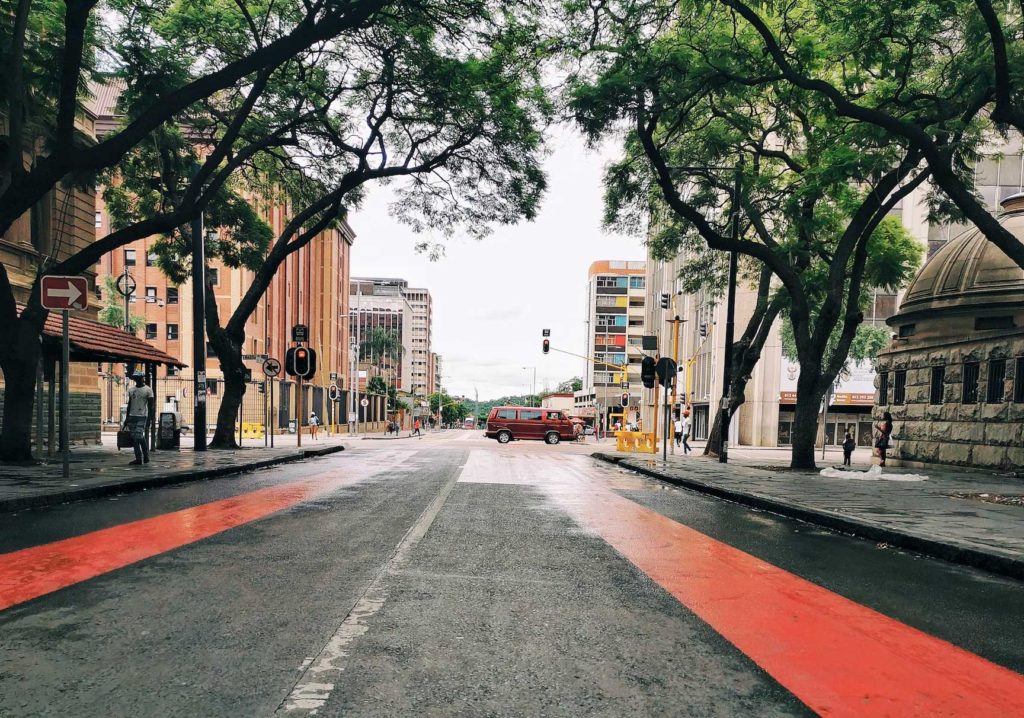
Culture and way of life in South Africa
South Africa is a country with a rich and diverse cultural heritage, shaped by centuries of indigenous traditions, colonial influences, and the struggles of the apartheid era. The culture and way of life in South Africa reflect a tapestry of different ethnicities, languages, and beliefs.
One of the defining features of South African culture is its diversity. The country is home to numerous ethnic groups, including Zulu, Xhosa, Afrikaner, English, Indian, and many more. Each group contributes its unique customs, languages, music, and cuisine, creating a vibrant and dynamic cultural landscape. This diversity is celebrated through colorful festivals, traditional dances, and the preservation of indigenous languages.
Ubuntu, a term meaning “humanity,” is a core value deeply ingrained in South African culture. It emphasizes the importance of community, compassion, and respect for others. The spirit of Ubuntu can be felt in the warm hospitality and friendliness of the people, as well as their strong sense of community and togetherness.
Music and dance play a significant role in South African culture. Traditional rhythms and melodies are fused with contemporary styles, resulting in vibrant genres like jazz, gospel, kwaito, and Afrobeat. The country has produced renowned musicians and artists who have made a significant impact both locally and internationally, such as Miriam Makeba, Hugh Masekela, and Ladysmith Black Mambazo.
South Africa’s cultural heritage is also reflected in its cuisine. Traditional dishes like bobotie (a spiced meat dish), boerewors (a type of sausage), biltong (dried cured meat), and samp and beans (a maize and bean stew) showcase the diverse influences of African, European, and Asian culinary traditions. The country is also known for its exceptional wines, with regions like Stellenbosch and Franschhoek producing world-class vintages.
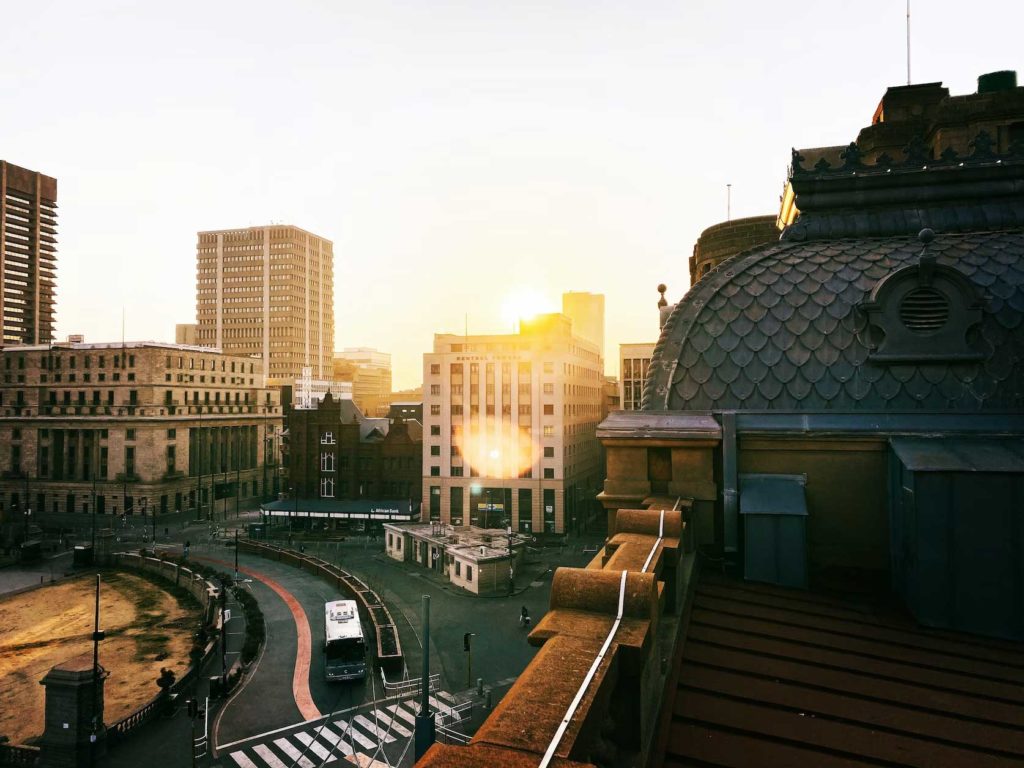
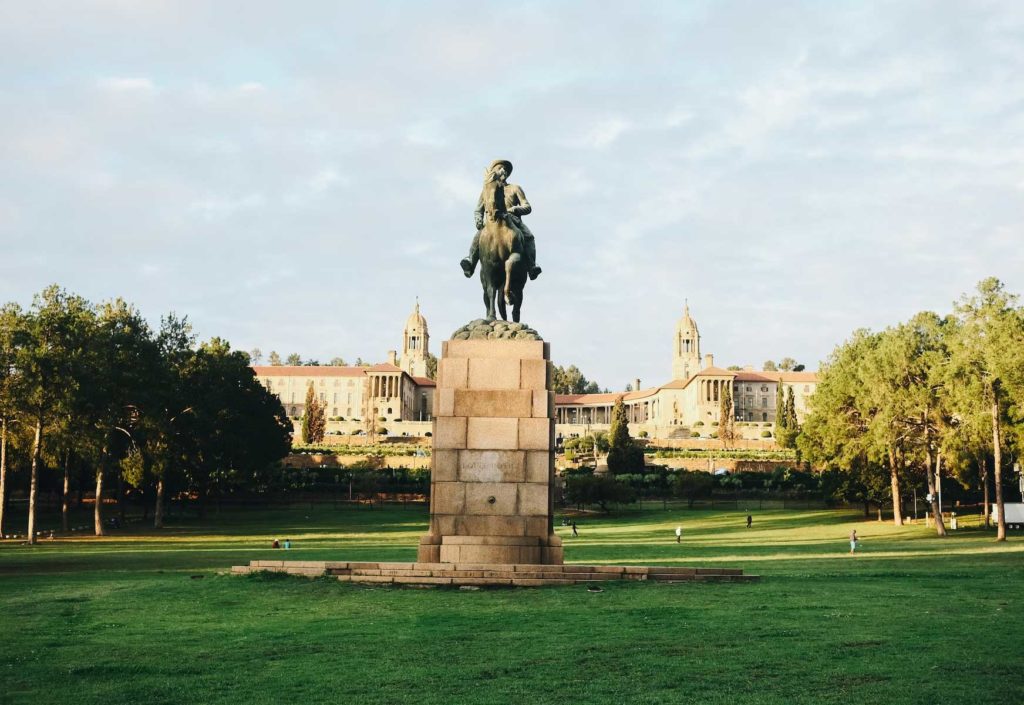
The way of life in South Africa varies depending on factors such as urban or rural environments, socioeconomic status, and cultural background. However, a love for outdoor activities is shared by many South Africans. From hiking the breathtaking Drakensberg Mountains to enjoying watersports along the coastal regions, the country’s natural beauty provides ample opportunities for adventure and relaxation.
It’s important to acknowledge that South Africa’s history includes periods of inequality, racial segregation, and social challenges. However, the country has made significant progress in promoting inclusivity, reconciliation, and social cohesion since the end of apartheid. While there are still ongoing efforts to address societal issues and promote equal opportunities for all, South Africa’s culture is resilient and continues to evolve, embracing diversity and fostering unity among its people.
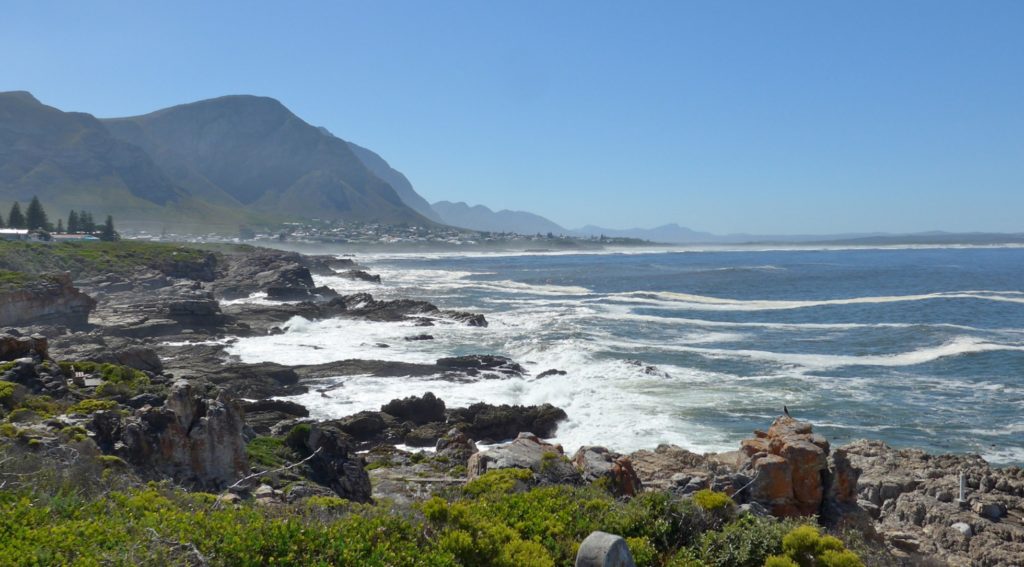
Must see in South Africa
Kruger National Park: Kruger National Park is a wildlife enthusiast’s dream, showcasing an incredible array of animals in their natural habitat. Spanning over 19,000 square kilometers, it offers opportunities for thrilling game drives, guided walks, and close encounters with the “Big Five” and other fascinating wildlife species.
Cape Town and Table Mountain: Cape Town, nestled between the Atlantic Ocean and Table Mountain, is a vibrant city with a breathtaking backdrop. Take a cable car ride or hike up Table Mountain for panoramic views, explore the vibrant V&A Waterfront, visit Robben Island, and indulge in the city’s diverse culinary scene.
The Garden Route: The Garden Route stretches along the picturesque coastline, offering stunning landscapes, charming towns, and outdoor adventures. Drive through lush forests, visit the Tsitsikamma National Park, explore the beautiful beaches, and enjoy activities like hiking, canoeing, and bungee jumping along this scenic route.
Robben Island: A visit to Robben Island provides a poignant journey into South Africa’s history. This UNESCO World Heritage site was once a political prison, where Nelson Mandela and other anti-apartheid activists were held. Guided tours by former political prisoners offer insights into the struggles and triumphs of the country’s fight for freedom.
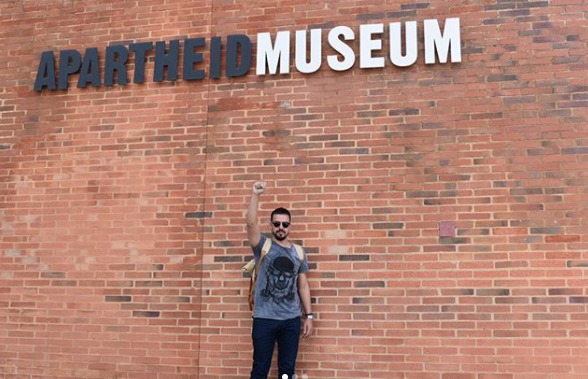
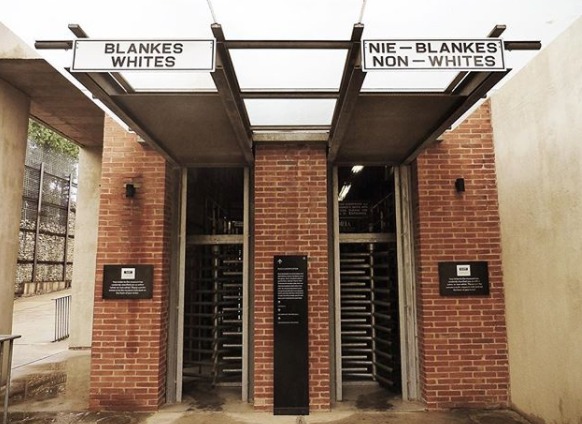
Drakensberg Mountains: The majestic Drakensberg Mountains offer breathtaking landscapes, including towering peaks, dramatic cliffs, and cascading waterfalls. Explore the Royal Natal National Park, hike to the Tugela Falls (the second highest waterfall in the world), and discover ancient rock art sites that showcase the region’s rich cultural heritage.
Stellenbosch and the Cape Winelands: Located near Cape Town, Stellenbosch is a picturesque town in the heart of the Cape Winelands. Enjoy wine tastings at world-renowned vineyards, explore historic Cape Dutch architecture, and savor delectable cuisine in charming wine estates.
Johannesburg and Soweto: Johannesburg is a vibrant city that offers a mix of history, culture, and urban energy. Explore the Apartheid Museum, visit the vibrant neighborhoods of Maboneng and Braamfontein, and take a tour of Soweto to learn about the legacy of Nelson Mandela and the struggle against apartheid.
Blyde River Canyon: Located in Mpumalanga, the Blyde River Canyon is one of the largest canyons in the world, offering awe-inspiring views and unique rock formations. Take in the sights of the Three Rondavels, God’s Window, and Bourke’s Luck Potholes, and enjoy hiking trails that showcase the region’s natural beauty.
Addo Elephant National Park: Addo Elephant National Park is a sanctuary for elephants and other wildlife species. Embark on game drives to spot elephants, lions, buffalo, and more. It also offers the unique opportunity to see marine life, including great white sharks and southern right whales, as it stretches to the coast.
Durban and the Golden Mile: Durban, a vibrant coastal city, is known for its warm weather, beautiful beaches, and cultural diversity. Explore the Golden Mile, visit uShaka Marine World, indulge in delicious Indian cuisine, and experience the city’s energetic atmosphere.
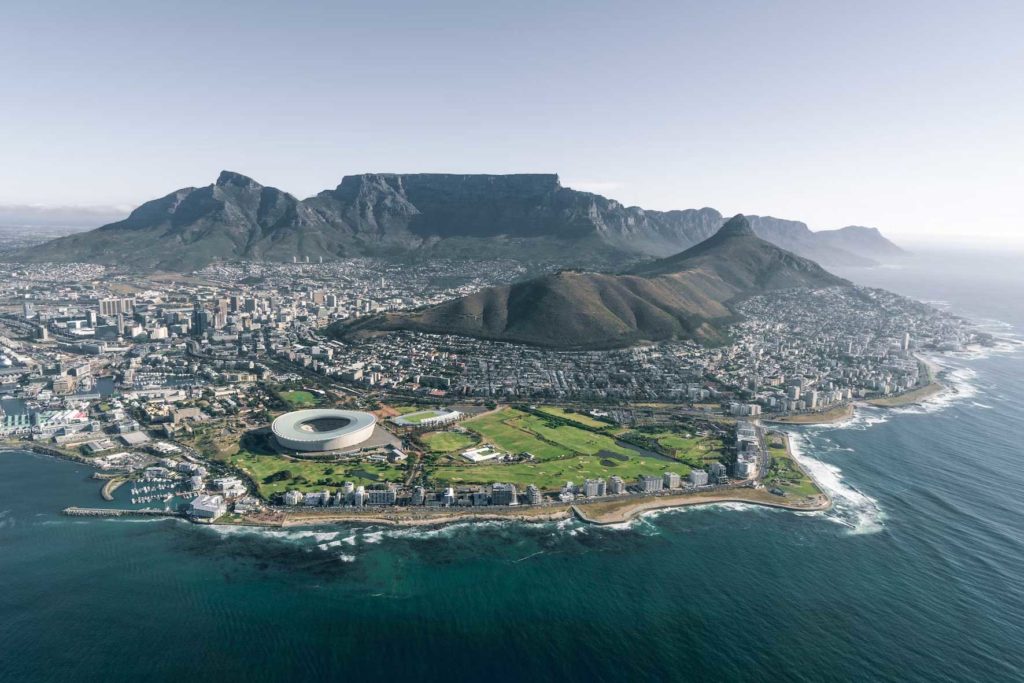
Must do experiences in South Africa
Safari in Kruger National Park: Embark on a safari adventure in Kruger National Park, one of Africa’s premier wildlife reserves. Witness the majestic “Big Five” and a plethora of other animals in their natural habitat, accompanied by experienced guides who provide insightful commentary and ensure an unforgettable wildlife encounter.
Explore Cape Town’s Table Mountain: Take a cable car or hike up Table Mountain in Cape Town for breathtaking panoramic views of the city, coastline, and surrounding landscapes. Enjoy stunning sunsets, spot unique flora and fauna, and revel in the sense of accomplishment that comes with reaching the summit of this iconic natural wonder.
Shark Cage Diving in Gansbaai: For an adrenaline-filled experience, head to Gansbaai, known as the “Great White Shark Capital of the World.” Dive into the ocean within the safety of a cage and come face-to-face with these magnificent predators. It’s an exhilarating adventure that offers a thrilling and unique opportunity to observe these awe-inspiring creatures up close.
Visit Robben Island: Journey to Robben Island, a symbol of South Africa’s struggle against apartheid, and take a guided tour led by former political prisoners. Learn about the harsh realities of life on the island and gain insights into the nation’s fight for freedom, with a particular focus on the incarceration of Nelson Mandela.
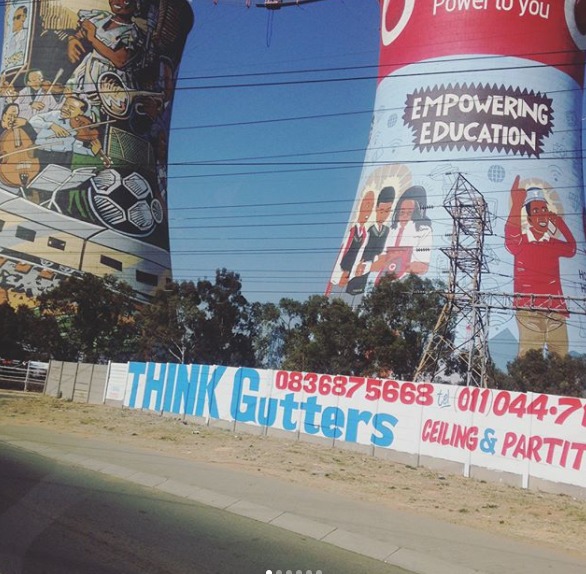
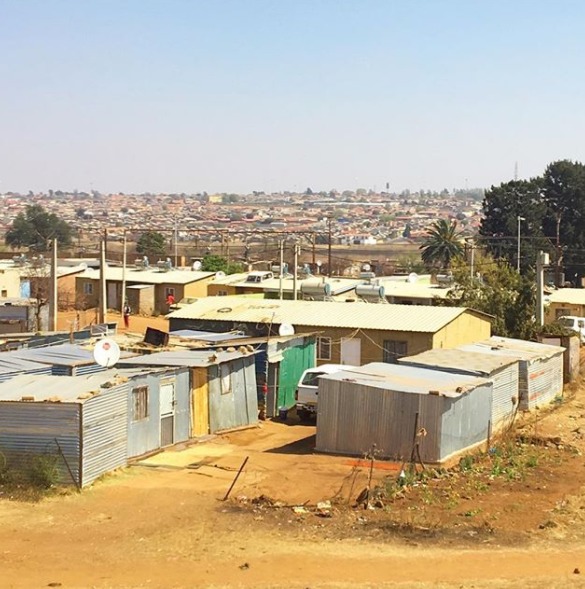
Wine Tasting in the Cape Winelands: Indulge in a wine tasting experience in the Cape Winelands, particularly in regions like Stellenbosch and Franschhoek. Explore picturesque vineyards, sample a wide variety of award-winning wines, and savor delectable food pairings while immersing yourself in the beauty of the surrounding landscapes.
Explore the Drakensberg Mountains: Lace up your hiking boots and venture into the scenic splendor of the Drakensberg Mountains. Embark on hiking trails that wind through breathtaking valleys, discover ancient rock art sites, and witness dramatic waterfalls. The Drakensberg offers outdoor enthusiasts a chance to connect with nature and experience the tranquility of these majestic peaks.
Discover the Cradle of Humankind: Journey to the Cradle of Humankind, a UNESCO World Heritage site, and explore the fascinating archaeological and paleontological treasures that reveal the origins of humankind. Visit the Sterkfontein Caves and Maropeng Visitor Centre to delve into the history of our species and marvel at ancient fossils.
Soweto Bicycle Tour: Take a bicycle tour through Soweto, a township near Johannesburg, to gain a deeper understanding of the country’s history and the impact of apartheid. Visit significant sites like Nelson Mandela’s former residence and interact with local communities, immersing yourself in the vibrant culture and resilience of its people.
Dive with Cape Fur Seals in Cape Town: Experience the thrill of diving with Cape Fur Seals in Cape Town. Join a guided snorkeling or scuba diving excursion to interact with these playful marine mammals in their natural habitat, swimming alongside them and witnessing their agile underwater antics.
Enjoy Beaches and Water Sports in Durban: Head to Durban, a coastal city known for its warm weather and beautiful beaches. Enjoy sun-soaked days by the ocean, try your hand at surfing, kiteboarding, or paddleboarding, and embrace the lively beach culture that makes Durban a popular destination for water sports enthusiasts.
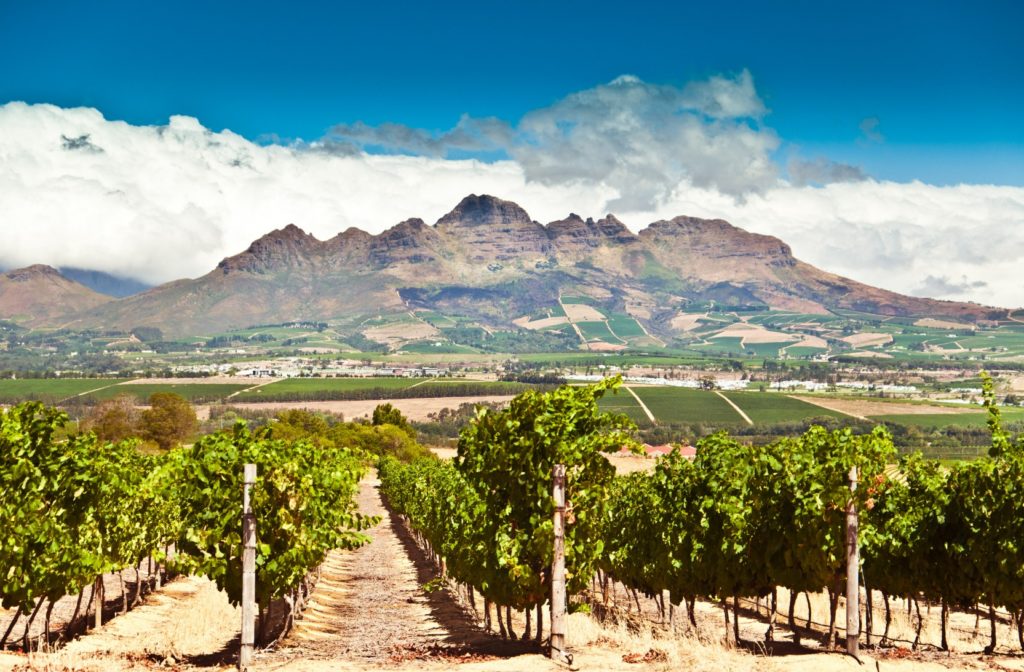
Explore the national parks in South Africa
Kruger National Park: Kruger National Park is one of Africa’s premier wildlife reserves, spanning over 19,000 square kilometers. It offers an exceptional safari experience, where visitors can spot the “Big Five” (elephants, lions, rhinos, leopards, and buffaloes) along with an abundance of other wildlife species. With diverse ecosystems, guided game drives, and luxurious lodges, Kruger National Park is a paradise for nature and wildlife enthusiasts.
Addo Elephant National Park: Located in the Eastern Cape, Addo Elephant National Park is renowned for its population of elephants, providing a unique opportunity to observe these gentle giants up close. In addition to elephants, the park is home to other animals such as lions, buffaloes, zebras, and a variety of bird species. Visitors can enjoy self-drive game viewing, guided safaris, and guided walking trails.
Kgalagadi Transfrontier Park: Spanning the borders of South Africa and Botswana, the Kgalagadi Transfrontier Park is a vast wilderness known for its stunning red sand dunes and unique desert-adapted wildlife. The park is famous for its predator sightings, including lions, cheetahs, and leopards. Visitors can enjoy game drives, guided walks, and camping under the clear African skies.
Table Mountain National Park: Table Mountain National Park encompasses the iconic Table Mountain and stretches along the Cape Peninsula, offering breathtaking landscapes and diverse flora and fauna. Hiking to the top of Table Mountain rewards visitors with panoramic views of Cape Town and the surrounding coastline. The park also includes beautiful beaches, picturesque coastal drives, and hiking trails in the Cape of Good Hope section.
Hluhluwe-iMfolozi Park: Located in KwaZulu-Natal, Hluhluwe-iMfolozi Park is one of the oldest game reserves in South Africa and a haven for conservation efforts. It is known for its successful rhino conservation programs and is home to the renowned “Big Five.” Visitors can embark on thrilling game drives, guided walks, and birdwatching excursions while enjoying the beauty of the African bush.
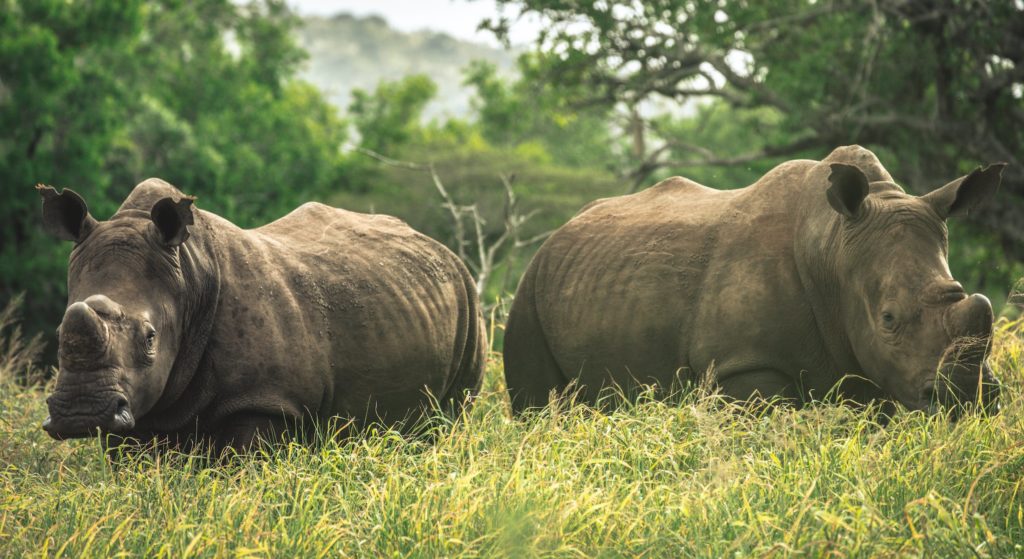
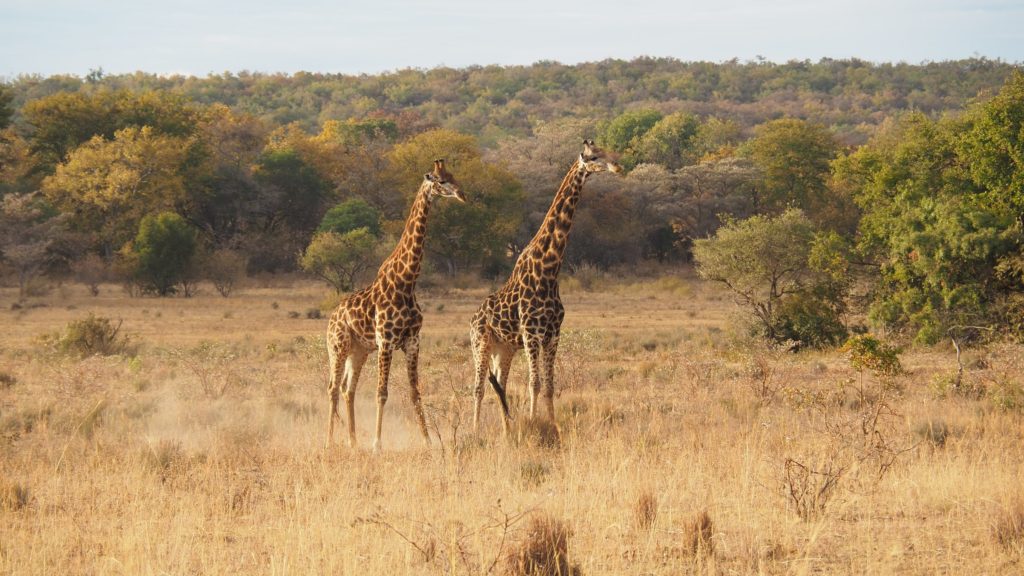
Augrabies Falls National Park: Situated in the Northern Cape, Augrabies Falls National Park showcases the powerful Augrabies Falls, a majestic waterfall on the Orange River. The park offers stunning views, hiking trails, and opportunities for wildlife sightings, including baboons, klipspringers, and various bird species. It’s a haven for nature lovers and a serene escape from the surrounding arid landscapes.
Golden Gate Highlands National Park: Nestled in the heart of the Maluti Mountains, Golden Gate Highlands National Park is renowned for its dramatic sandstone cliffs, rolling grasslands, and vibrant golden hues during sunrise and sunset. The park offers scenic drives, hiking trails, and an abundance of indigenous flora and fauna. Visitors can explore the unique geological formations and admire the breathtaking landscapes.
Mountain Zebra National Park: Mountain Zebra National Park, situated in the Eastern Cape, is dedicated to the preservation of the Cape mountain zebra. The park offers sightings of these endangered zebras, as well as other wildlife species such as black rhinos, cheetahs, and various antelope species. Visitors can enjoy game drives, self-guided walking trails, and birdwatching.
Marakele National Park: Marakele National Park, located in the Waterberg Mountains of Limpopo, is characterized by its vast landscapes, rugged mountains, and abundant wildlife. The park is home to the “Big Five” and offers excellent birdwatching opportunities, with over 400 bird species recorded. Visitors can explore the park through game drives, guided walks,and hiking trails that lead to stunning viewpoints overlooking the expansive plains. The park’s diverse habitats, including grasslands, forests, and wetlands, contribute to its rich biodiversity and make it an ideal destination for nature lovers.
West Coast National Park: Situated along the picturesque West Coast of South Africa, the West Coast National Park is known for its stunning coastal scenery, tranquil lagoons, and abundant birdlife. During the spring months, the park bursts into color with vibrant wildflowers, creating a captivating spectacle. Visitors can explore the park’s walking trails, go birdwatching, enjoy picnics by the lagoon, and even spot wildlife such as ostriches and eland. Langebaan, a charming seaside town within the park’s boundaries, offers opportunities for water sports, beach relaxation, and delectable seafood dining
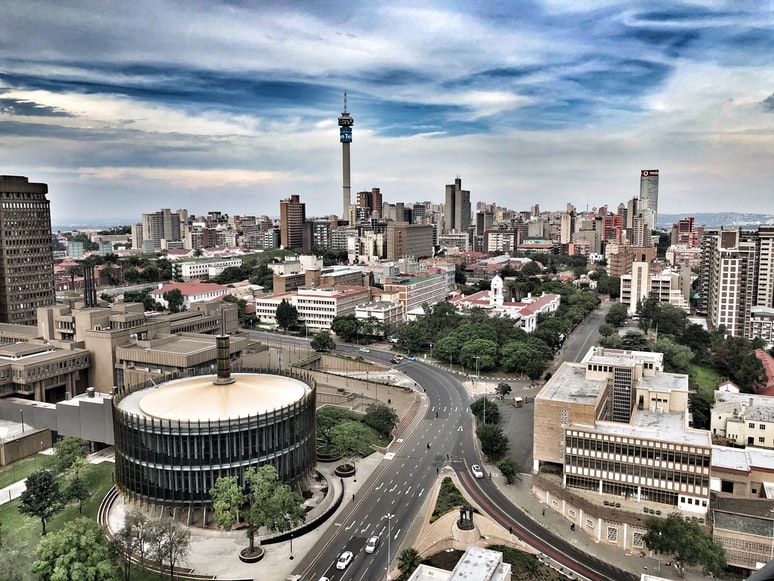
Top 10 iconic and most luxurious hotels of South Africa
The Oyster Box Hotel (Umhlanga, Durban): Situated on the shores of Umhlanga, this iconic and luxurious hotel offers a blend of colonial charm and modern elegance. With stunning ocean views, exquisite dining options, a world-class spa, and impeccable service, The Oyster Box Hotel provides a truly indulgent experience.
The Silo Hotel (Cape Town): Located in the iconic Silo District of Cape Town, this stylish and contemporary hotel boasts breathtaking views of Table Mountain and the city skyline. With its lavish suites, rooftop pool, gourmet dining, and proximity to popular attractions, The Silo Hotel combines luxury and sophistication in a truly unique setting.
Singita Lebombo Lodge (Kruger National Park): Nestled in the heart of Kruger National Park, Singita Lebombo Lodge offers an exclusive safari experience. This ultra-luxurious lodge features modern design, private suites with panoramic views, gourmet cuisine, and thrilling game drives led by experienced guides, ensuring an unforgettable encounter with Africa’s wildlife.
The Twelve Apostles Hotel and Spa (Cape Town): Set on the scenic Atlantic coastline, The Twelve Apostles Hotel and Spa is renowned for its breathtaking location and impeccable service. With luxurious rooms, a tranquil spa, award-winning restaurants, and easy access to Table Mountain and the Cape Peninsula, this hotel provides a serene retreat for discerning travelers.
Royal Malewane (Thornybush Private Game Reserve): As one of South Africa’s most exclusive safari lodges, Royal Malewane offers an unrivaled luxury safari experience. With opulent suites, a world-class spa, exquisite cuisine, and expertly guided game drives, guests can immerse themselves in the splendor of the African bush.
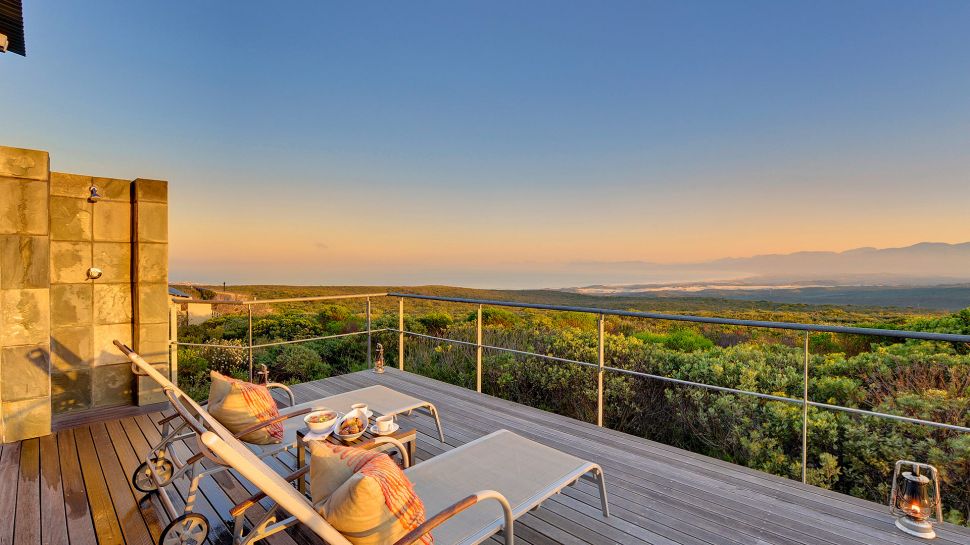
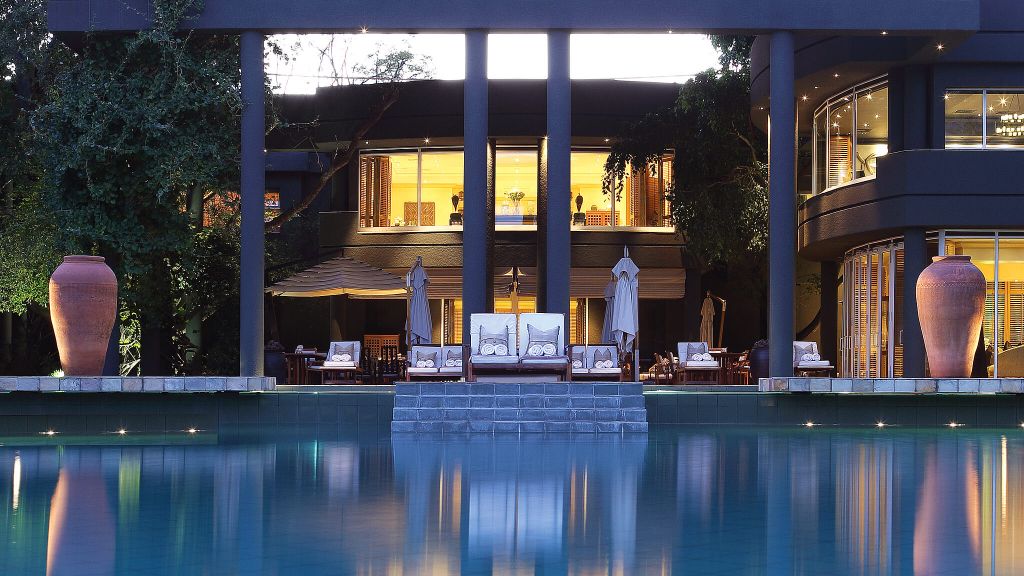
Delaire Graff Estate (Stellenbosch, Western Cape): Combining art, wine, and luxury, Delaire Graff Estate offers a refined experience in the heart of the Cape Winelands. With breathtaking vineyard views, exceptional wines, a Michelin-starred restaurant, luxurious accommodations, and an impressive art collection, this estate is a true haven for wine and art enthusiasts.
The Saxon Hotel, Villas, and Spa (Johannesburg): Situated in the upscale suburb of Sandhurst, The Saxon Hotel is an oasis of tranquility and elegance. With luxurious suites, lush gardens, a renowned spa, and world-class dining, this hotel offers a serene escape in the midst of the bustling city.
Bushmans Kloof Wilderness Reserve and Wellness Retreat (Cederberg Mountains): Located in the scenic Cederberg Mountains, this exclusive retreat offers a unique combination of luxury, nature, and wellness. With its luxurious accommodations, award-winning cuisine, and a range of outdoor activities including nature drives, hiking, and spa treatments, Bushmans Kloof provides a rejuvenating and intimate experience.
Ellerman House (Cape Town): Situated in the prestigious suburb of Bantry Bay, Ellerman House is a luxurious boutique hotel known for its personalized service and spectacular views of the Atlantic Ocean. With its elegant suites, extensive art collection, wine cellar, and world-class cuisine, this hotel epitomizes refined luxury.
La Residence (Franschhoek, Western Cape): Set in the picturesque Franschhoek Valley, La Residence is a grand and opulent hotel surrounded by vineyards and mountains. With its lavish suites, exceptional service, award-winning cuisine, and exquisite decor, La Residence offers an enchanting and luxurious escape in the heart of the Cape Winelands.
These iconic and luxurious hotels in South Africa offer unparalleled comfort, exceptional service, and unforgettable experiences, allowing guests to indulge in the country’s natural beauty and vibrant hospitality while

Food and drinks
Food specialities of South Africa that you should try
South Africa is a culinary haven with a rich and diverse food culture influenced by a fusion of indigenous traditions, European, Asian, and African flavors. From hearty meats to vibrant spices and unique ingredients, the country’s food specialties are a reflection of its multicultural heritage. Here are some notable South African dishes:
Braai: Considered a social institution in South Africa, the braai is more than just a barbecue. It’s a celebration of grilled meats, often including boerewors (spiced sausage), steak, lamb chops, and chicken. The smoky flavors and the social gathering around the fire make braai a quintessential South African experience.
Bobotie: This Cape Malay dish is a savory and fragrant baked mince meat dish, traditionally made with spiced ground beef or lamb mixed with raisins, apricot chutney, and a creamy egg-based topping. It’s usually served with yellow rice and adds a touch of sweetness to the South African culinary scene.
Bunny Chow: Originating from the Indian community in Durban, bunny chow is a popular street food dish. It consists of a hollowed-out loaf of bread filled with a flavorful curry, often made with chicken, lamb, or beans. This handheld delight is a unique and delicious representation of the fusion of Indian and South African flavors.
Biltong: Biltong is a beloved South African snack made from air-dried cured meat, typically beef or game such as springbok or kudu. The meat is marinated in a mix of vinegar, spices, and herbs before being air-dried to perfection. Biltong is enjoyed as a protein-packed snack and is available in various flavors and textures.
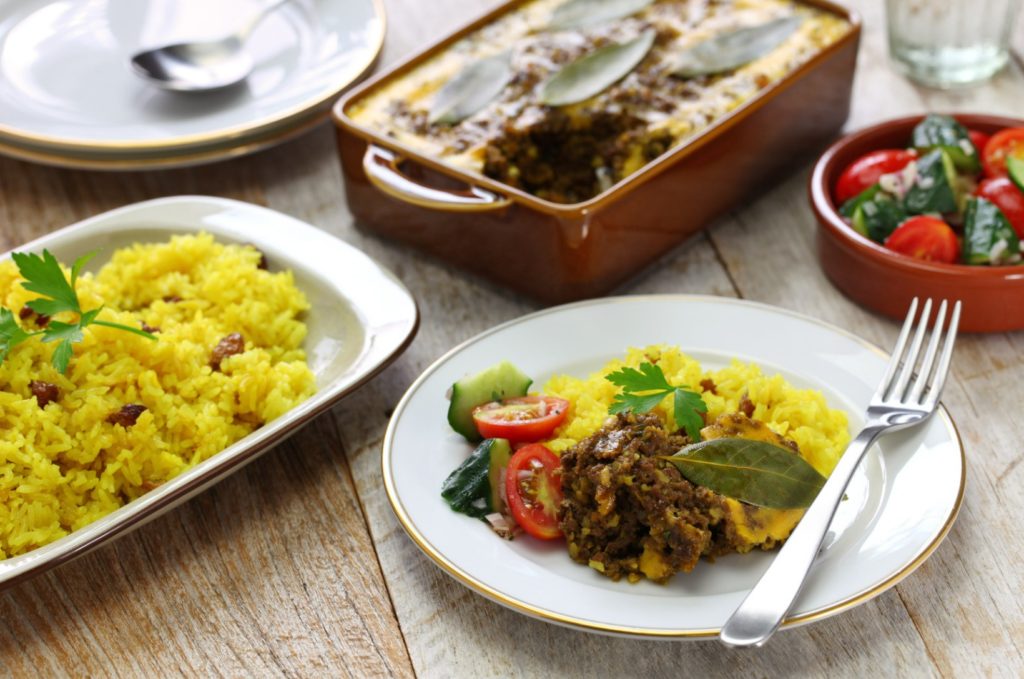
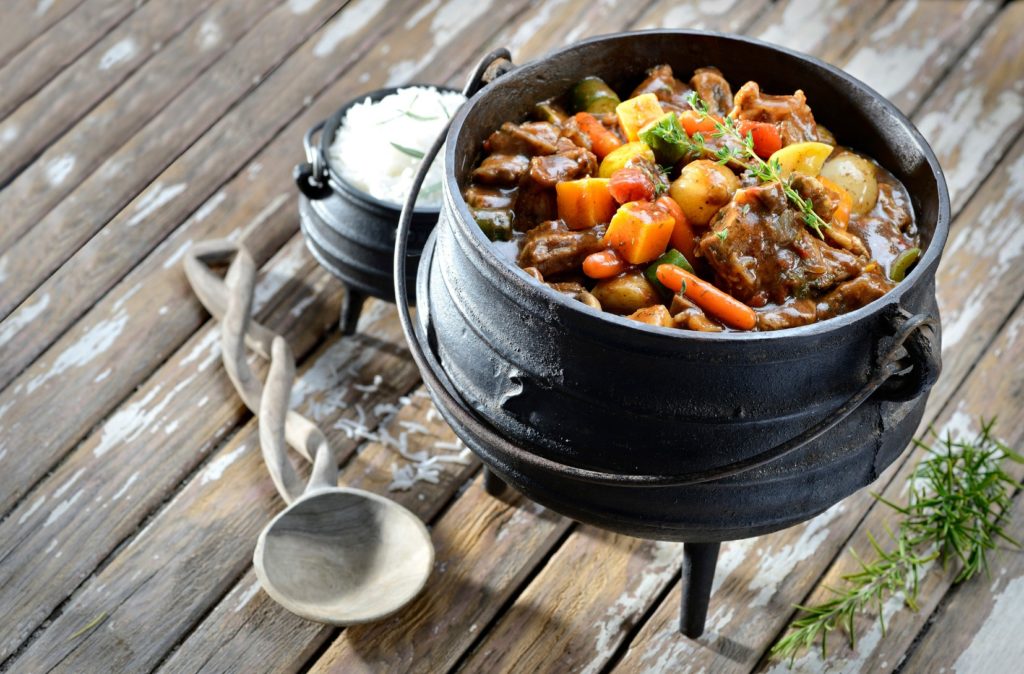
Potjiekos: Potjiekos is a traditional stew cooked in a cast-iron pot over an open fire. It typically includes a combination of meat, vegetables, and spices simmered slowly to create a rich and flavorsome dish. The communal aspect of cooking and sharing potjiekos makes it a cherished South African culinary tradition.
Boerewors: Boerewors is a traditional South African sausage made with coarsely minced beef, pork, or lamb mixed with a blend of spices such as coriander, cloves, and nutmeg. It’s known for its distinctive spiral shape and is often cooked on a braai or fried. Boerewors is a staple at social gatherings and is enjoyed with mustard, chutney, or in a traditional “boerewors roll” (sausage in a bun).
Malva Pudding: Malva Pudding is a sweet and sticky dessert with Cape Dutch origins. It’s a moist sponge cake drenched in a hot caramelized syrup and often served with custard or vanilla ice cream. This comforting and indulgent dessert is a true South African classic.
Melktert: Melktert, meaning “milk tart” in Afrikaans, is a sweet pastry crust filled with a creamy, custard-like mixture made from milk, sugar, and eggs. It’s delicately spiced with cinnamon and nutmeg and is enjoyed as a popular dessert or teatime treat.
Koeksisters: Koeksisters are a traditional Afrikaner pastry made by deep-frying plaited dough, then soaking it in a sweet and sticky syrup. These syrup-drenched pastries have a crunchy exterior and a sweet, moist center, making them an indulgent and irresistible treat.
Cape Malay Curry: The Cape Malay community has enriched South Africa’s culinary landscape with their aromatic and flavorful curries. Influenced by Indonesian and Indian cuisines, Cape Malay curries are known for their complex spice blends, combining sweet and savory flavors. They often feature a mix of spices such as cumin, coriander, turmeric, and cardamom, resulting in a fragrant and mild curry. Cape Malay curries are typically made with meat, seafood, or vegetables and are served with fragrant rice and sambals, creating a harmonious balance of flavors.
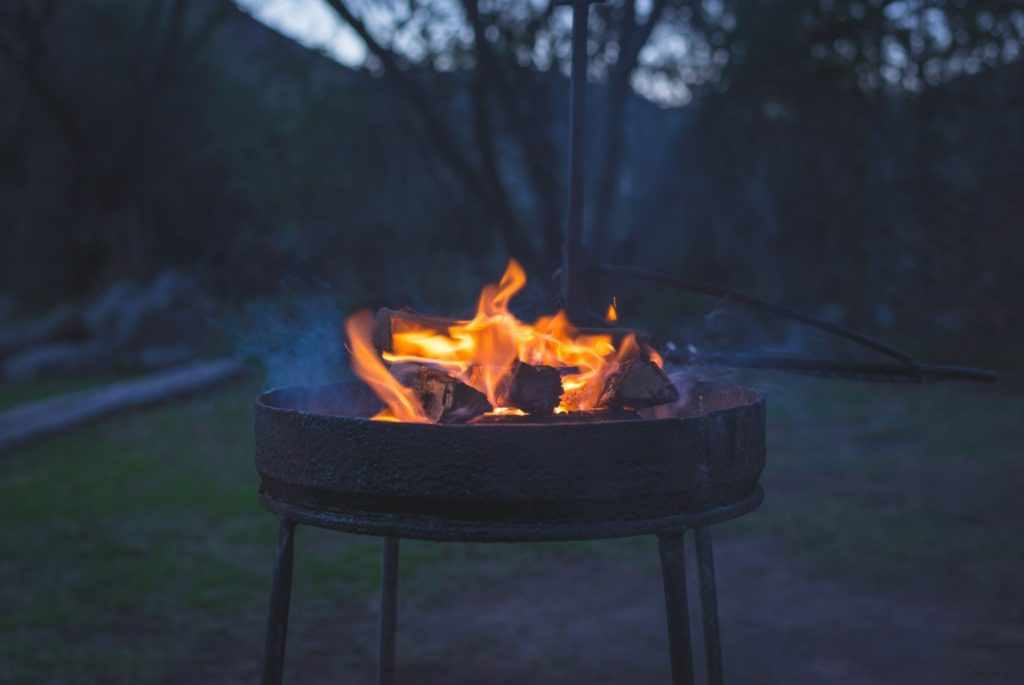
Top 10 restaurants in South Africa
The Test Kitchen – Located in Cape Town, The Test Kitchen is helmed by acclaimed chef Luke Dale-Roberts. Known for its innovative and adventurous culinary creations, the restaurant offers a multi-course tasting menu that takes diners on an exciting gastronomic journey, incorporating diverse flavors and textures.
La Colombe – Situated in Constantia, Cape Town, La Colombe boasts breathtaking views of the surrounding vineyards. The restaurant is led by chef James Gaag, who creates refined and artfully presented dishes that highlight local ingredients. With a fusion of French and Asian influences, La Colombe offers an unforgettable fine dining experience.
The Restaurant at Waterkloof – Perched on the slopes of the Schapenberg Mountains in Somerset West, The Restaurant at Waterkloof presents exquisite cuisine by chef Gregory Czarnecki. The menu showcases a modern interpretation of French classics, complemented by panoramic views of the vineyards and False Bay.
Wolfgat – Tucked away in Paternoster, a picturesque coastal town, Wolfgat is a small restaurant with a big reputation. Chef Kobus van der Merwe crafts a unique dining experience inspired by the natural landscape, featuring sustainable seafood, foraged ingredients, and inventive dishes that celebrate the flavors of the West Coast.
Foliage – Located in Franschhoek, Foliage showcases the culinary expertise of chef Chris Erasmus. With a focus on seasonal and locally sourced ingredients, the restaurant offers a menu that blends traditional and contemporary flavors, delivering a memorable dining experience that reflects the essence of the Cape Winelands.
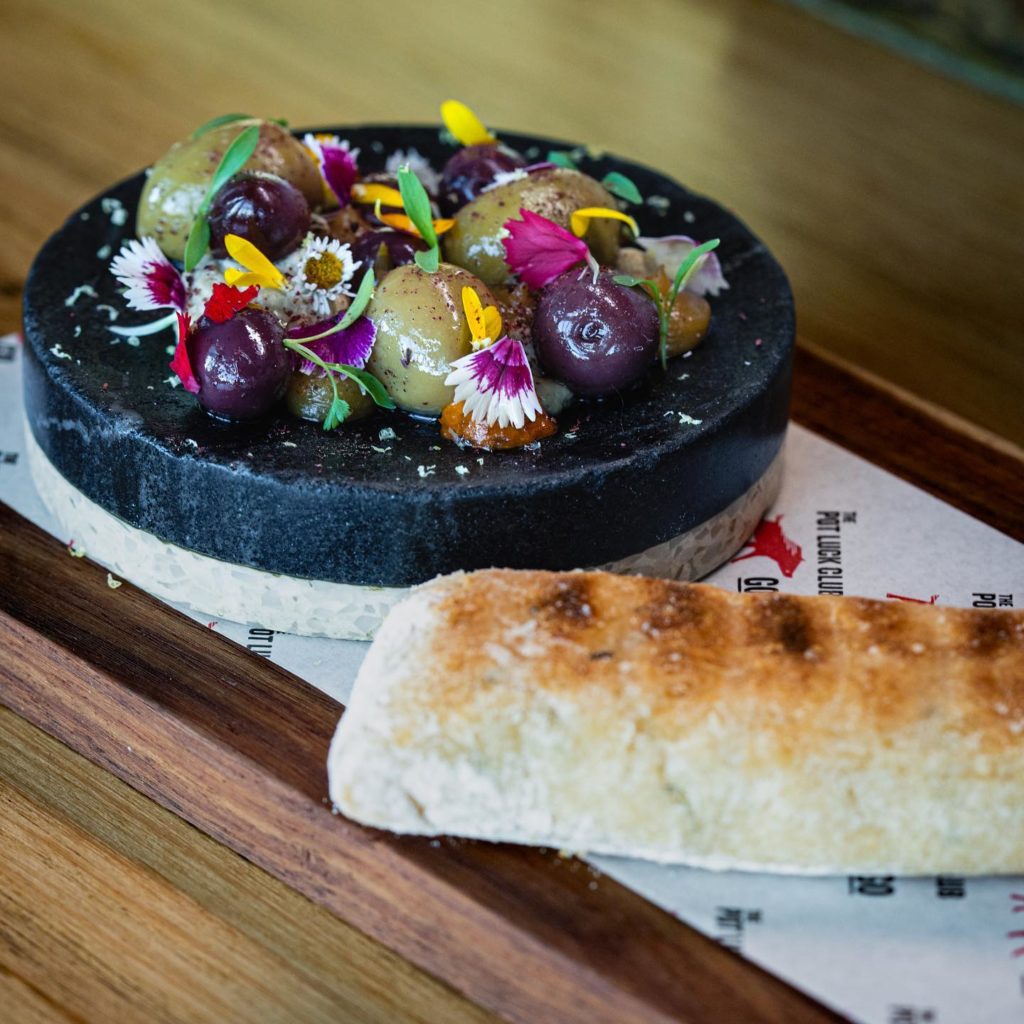
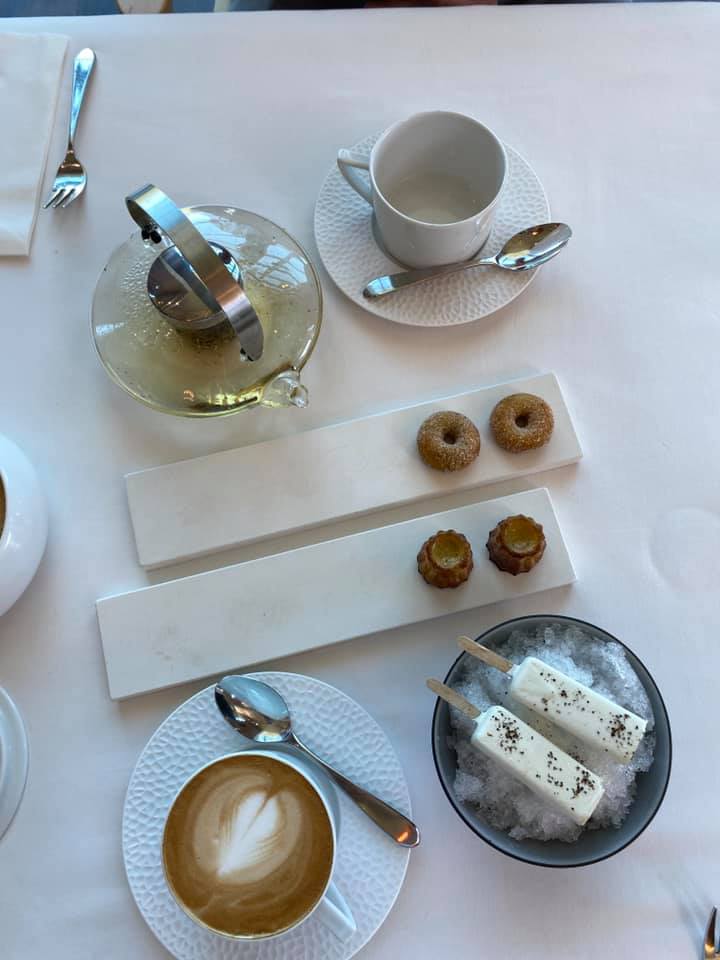
The Tasting Room at Le Quartier Français – Situated in Franschhoek, The Tasting Room is renowned for its innovative cuisine by chef Margot Janse. Drawing inspiration from African ingredients and flavors, the restaurant presents a multi-course tasting menu that showcases exceptional culinary artistry and pushes the boundaries of fine dining.
Greenhouse – Located at The Cellars-Hohenort Hotel in Cape Town, Greenhouse showcases the culinary mastery of chef Farrel Hirsch. The restaurant offers a gastronomic journey through South African ingredients, blending global techniques with local flavors to create a menu that surprises and delights the palate.
The Pot Luck Club – Situated in Cape Town’s vibrant Silo District, The Pot Luck Club, headed by chef Luke Dale-Roberts, presents a tapas-style dining experience with panoramic views of the city. The menu features an array of international flavors and small plates that encourage sharing and exploration.
Chefs Warehouse at Beau Constantia – Nestled in the Constantia Wine Valley, Chefs Warehouse offers a contemporary dining experience overseen by chef Liam Tomlin. The restaurant focuses on tapas-style plates with global influences, showcasing inventive combinations and bold flavors that highlight the finest local produce.
Terroir – Located in Stellenbosch, Terroir is led by chef Michael Broughton and offers a farm-to-table dining experience in a picturesque setting. The menu highlights seasonal ingredients sourced from nearby farms, resulting in dishes that emphasize simplicity, quality, and refined flavors.
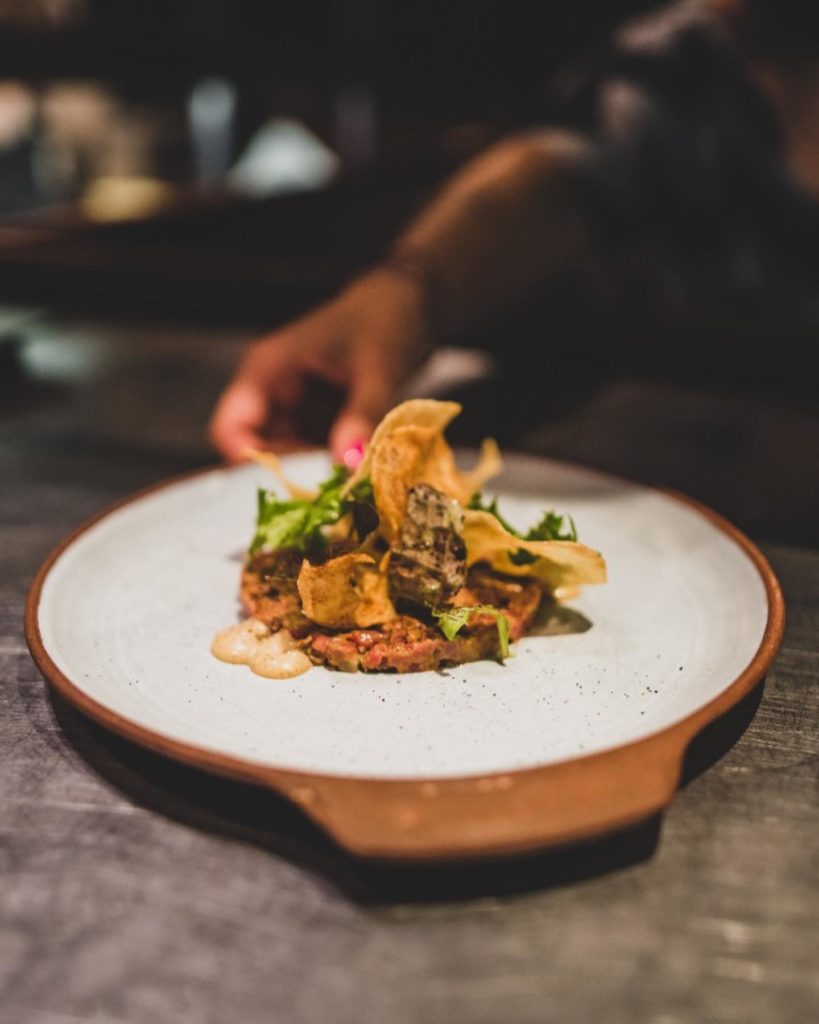
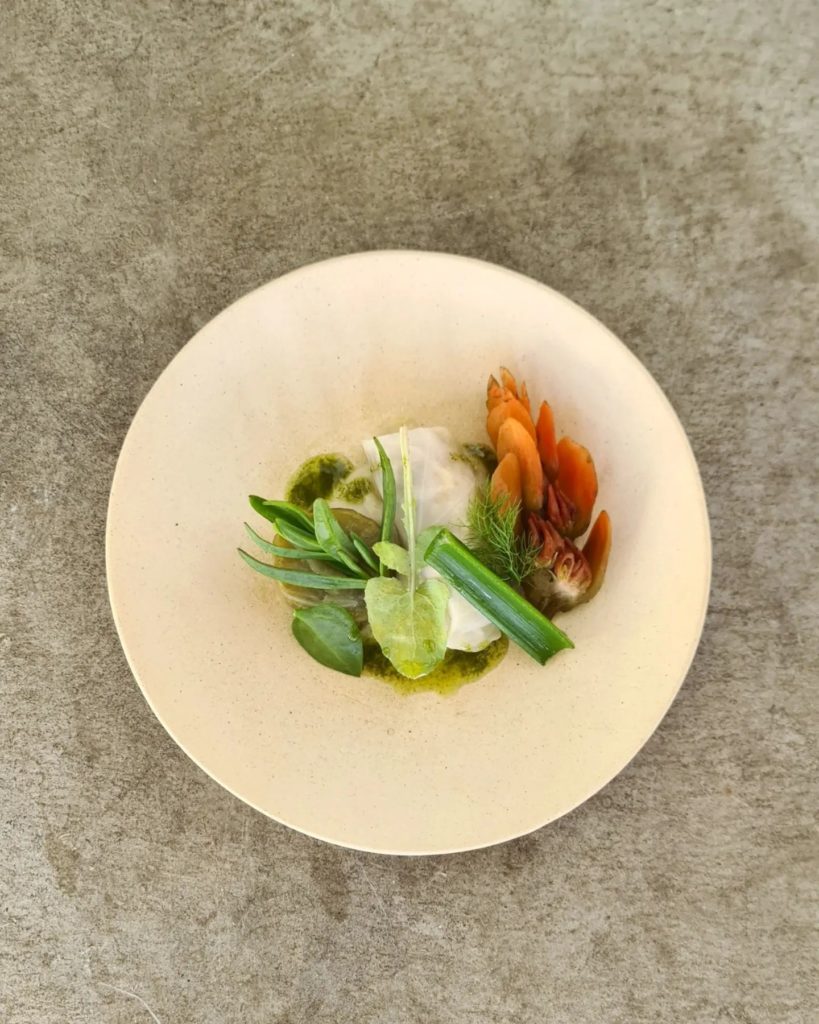
Shopping, taxes and tipping in South Africa
Value Added Tax (VAT): South Africa imposes a Value Added Tax (VAT) on most goods and services. As of my knowledge cutoff in September 2021, the standard VAT rate is 15%. This tax is usually included in the displayed prices of goods and services, so the final price you see is the amount you’ll pay.
Service Charges: In restaurants and hotels, a service charge, typically around 10% to 15% of the bill, may be added to your total. This charge is meant to cover the service provided by the staff. However, it’s important to check the bill carefully, as some establishments may not include a service charge. If no service charge is included, it is customary to tip the service staff directly.
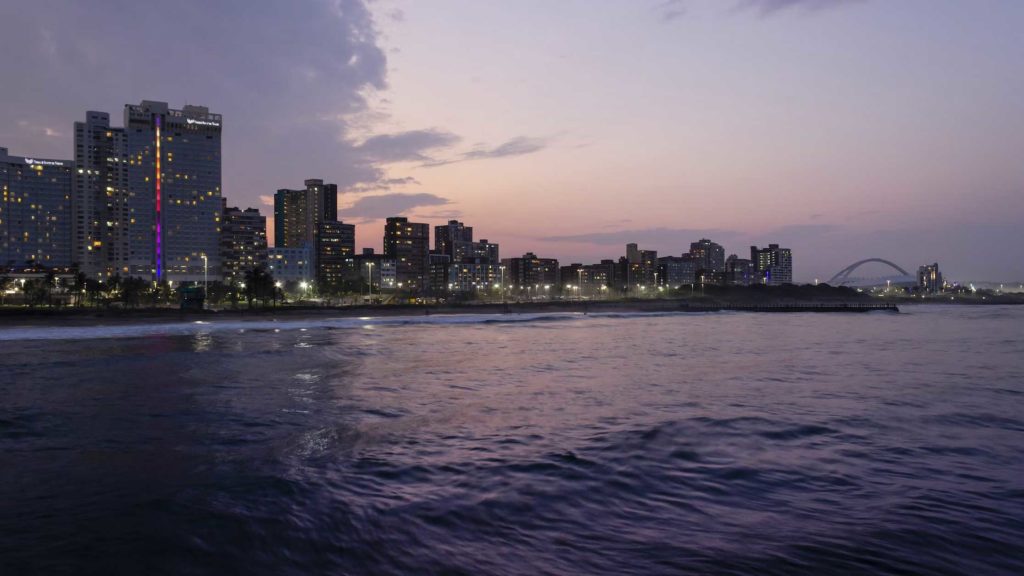
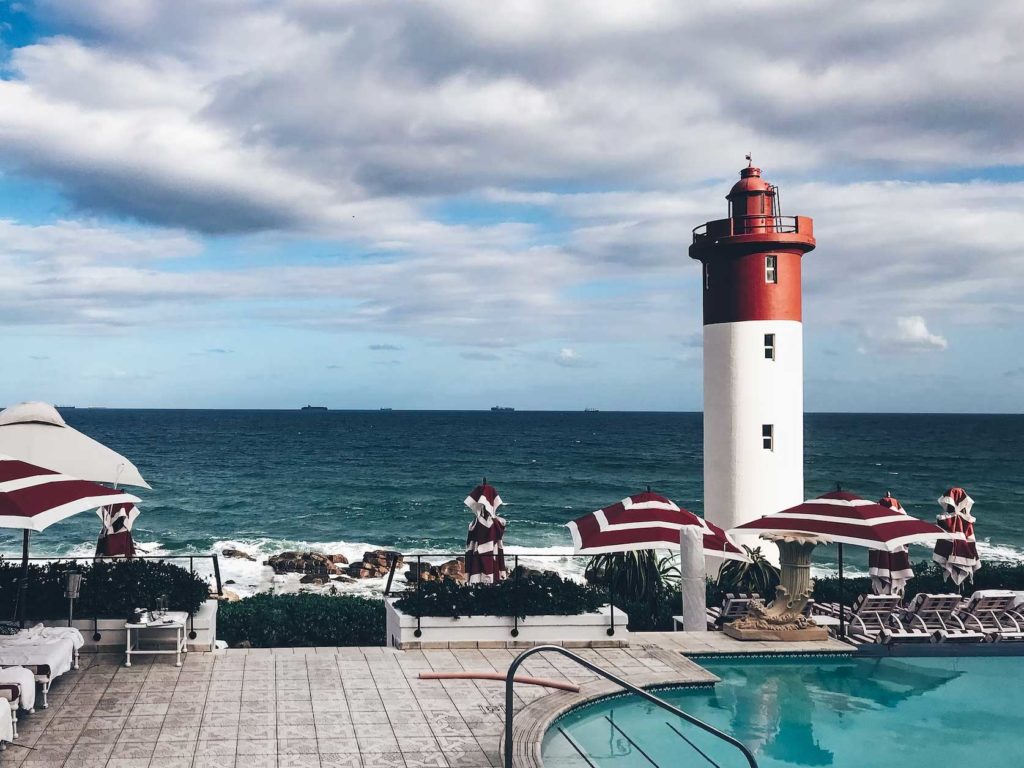
Tipping: Tipping is common in South Africa, particularly for restaurant servers, taxi drivers, hotel staff, and other service providers. The general guideline for tipping in restaurants is to leave a tip of around 10% to 15% of the total bill if a service charge is not included. For exceptional service, you may choose to give a larger tip. It’s customary to tip taxi drivers, hotel porters, and tour guides as well, usually around 10% of the service cost.
Cash or Card: South Africa has a well-established banking system, and most establishments accept credit and debit cards for payment. However, it’s advisable to carry some cash for smaller vendors, taxis, or situations where cards may not be accepted. ATMs are widely available in cities and towns for cash withdrawals.
Tourist VAT Refund: As a non-resident, you may be eligible for a VAT refund on goods you purchase in South Africa and take out of the country. To qualify, you must follow the necessary procedures at the point of purchase and present the goods, original tax invoices, and passport at the VAT refund office at the airport before departing.
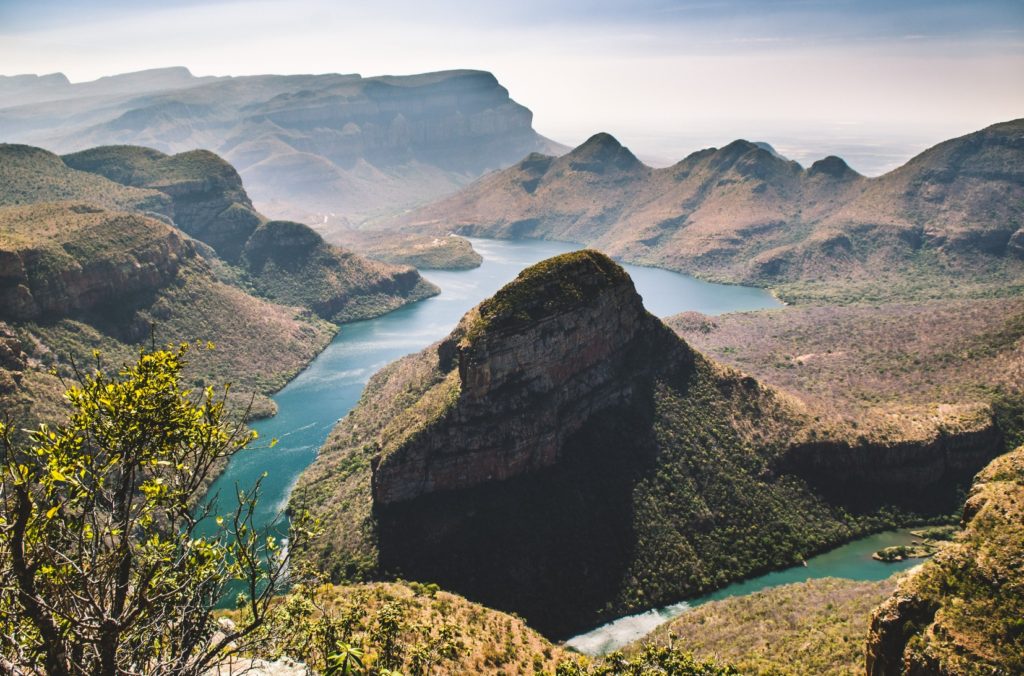
What not to do in South Africa, things to avoid
While South Africa is a beautiful and welcoming country, it’s important to be aware of certain things to avoid to ensure a safe and pleasant experience. Here are some guidelines on what not to do in South Africa:
Safety in Urban Areas: Exercise caution in urban areas, especially in major cities like Johannesburg, Cape Town, and Durban. Avoid displaying valuable items openly and be mindful of your surroundings. Keep an eye on your belongings, especially in crowded places, to prevent theft or pickpocketing.
Public Transportation at Night: It’s advisable to avoid using public transportation, such as buses or trains, during late hours, particularly in unfamiliar or unsafe areas. Instead, opt for reputable taxi services or ridesharing platforms for reliable and secure transportation.
Walking Alone at Night: Walking alone at night, especially in poorly lit or isolated areas, can pose risks. It’s safer to travel in groups or take a taxi, even for short distances, to ensure personal safety.
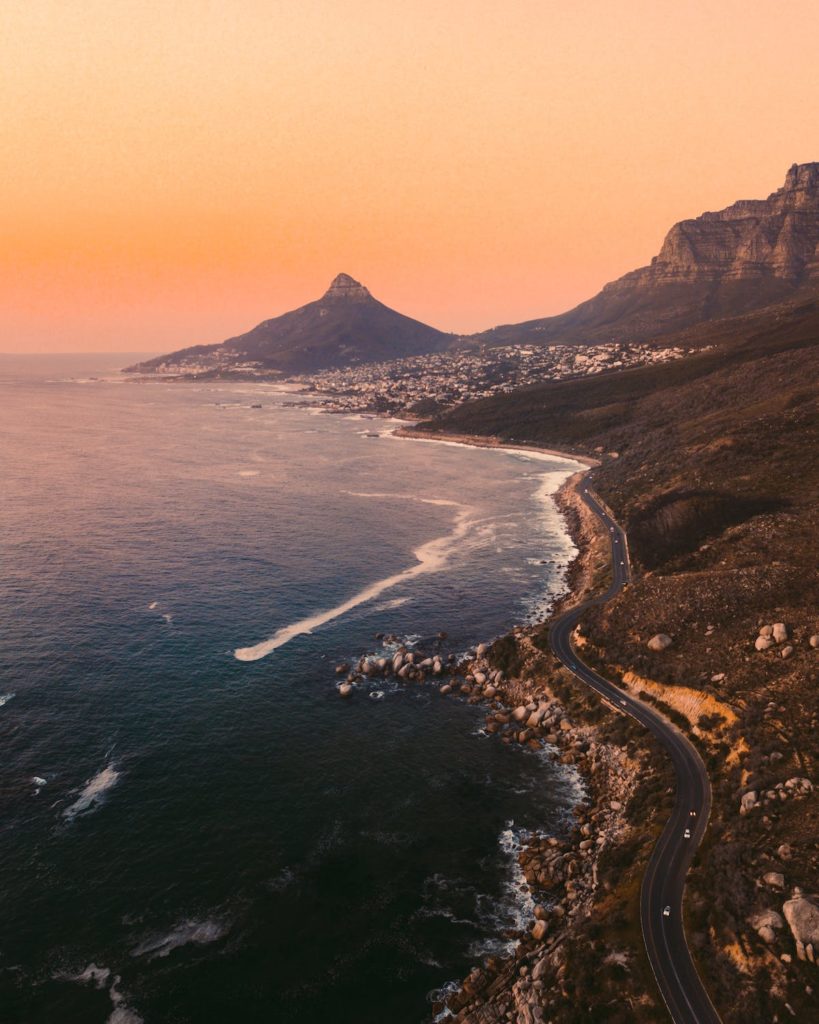
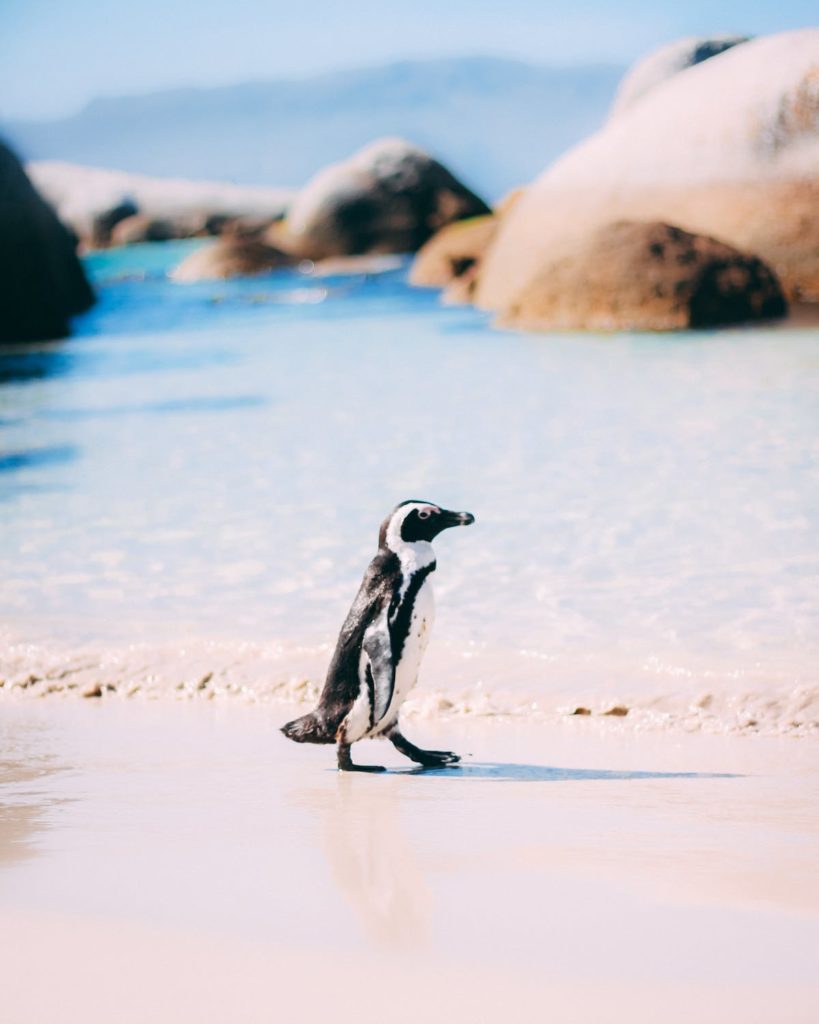
Flashing Wealth: Avoid displaying excessive wealth or expensive items in public, as it may attract unwanted attention. Keep valuable possessions, including jewelry, cameras, and electronic devices, discreetly hidden to minimize the risk of theft or potential incidents.
Wildlife Interactions: While South Africa is renowned for its wildlife, it’s crucial to respect their natural habitats and adhere to guidelines when observing or encountering animals. Avoid feeding or approaching wild animals, maintain a safe distance, and follow the instructions of trained guides to ensure your safety and the well-being of the wildlife.
Hitchhiking: Hitchhiking is not recommended in South Africa due to safety concerns. Instead, rely on reputable taxi services, ridesharing apps, or prearranged transportation options for travel between destinations.
Political and Social Discussions: Engaging in sensitive political or social discussions without a thorough understanding of the context and history can be contentious. It’s best to approach such topics with sensitivity and respect for different perspectives.
Overlooking Travel Insurance: It’s strongly advised to have comprehensive travel insurance that covers medical emergencies, trip cancellations, and theft or loss of belongings. Be sure to review and understand the terms and conditions of your insurance policy before traveling to South Africa.
Neglecting Health Precautions: South Africa, like any destination, has its health considerations. It’s recommended to consult with a healthcare professional before traveling to ensure you are up to date on vaccinations and take necessary precautions, such as using mosquito repellent in malaria-prone areas.
Disregarding Local Customs: South Africa has diverse cultural practices and customs. It’s essential to respect and observe local customs, traditions, and social norms. For example, when visiting sacred sites or interacting with local communities, dress modestly and seek permission before taking photographs.
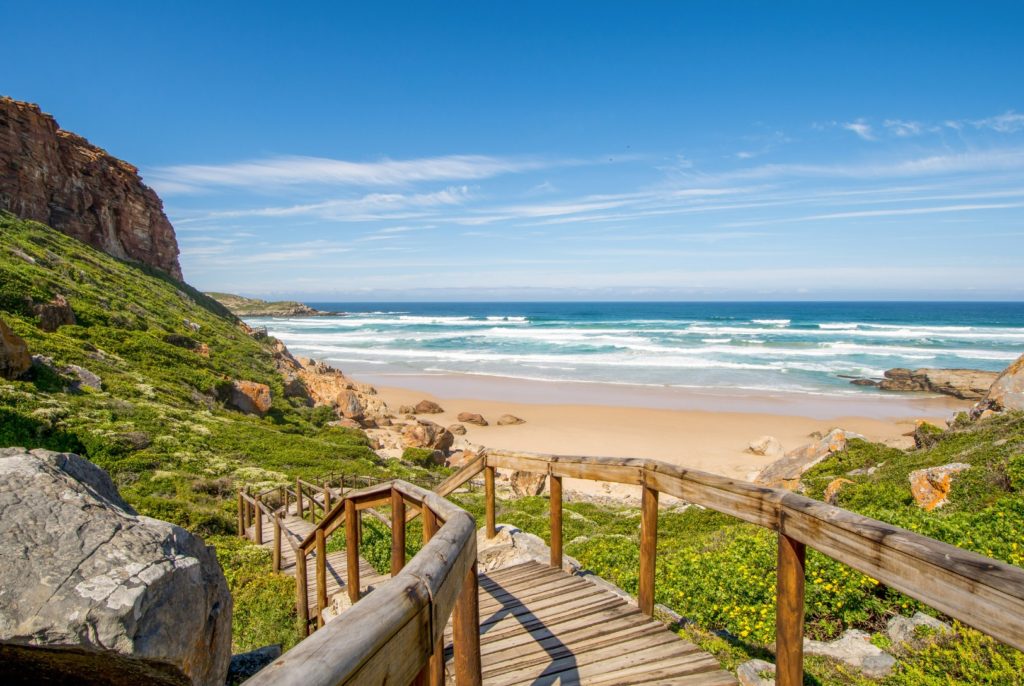
Safety and security in South Africa
Safety and security are important considerations for any traveler, and South Africa is no exception. While the country offers incredible experiences and diverse landscapes, it’s essential to be aware of certain safety precautions. Here’s a presentation on safety and security in South Africa:
General Safety Awareness: Like in any destination, it’s advisable to remain vigilant and exercise common sense while traveling in South Africa. Stay informed about the current situation in the areas you plan to visit, and heed the advice of local authorities and trusted sources regarding safety concerns.
Urban Areas and Petty Crime: While South Africa has vibrant cities, including Johannesburg, Cape Town, and Durban, it’s important to take precautions against petty crime. Be cautious with your belongings, avoid displaying valuable items openly, and be mindful of your surroundings, particularly in crowded places or tourist areas.
Transportation: Use reputable transportation options, such as licensed taxis or ridesharing services, and avoid informal or unmarked vehicles. Ensure that your belongings are secure when using public transportation, and be cautious when traveling at night or in isolated areas.
Accommodation Safety: Choose reputable and secure accommodations, such as established hotels, guesthouses, or lodges. Check the safety measures provided by the accommodation, such as secure access, CCTV cameras, and in-room safes for storing valuables.
Nature Reserves and Wildlife: South Africa is renowned for its wildlife, and when visiting national parks and game reserves, it’s crucial to respect the guidelines provided by park authorities. Follow instructions from trained guides, maintain a safe distance from animals, and avoid feeding or provoking wildlife.
Outdoor Activities and Adventure Sports: South Africa offers a variety of adventurous activities, such as hiking, diving, and safari tours. Ensure that you engage in these activities with reputable operators who adhere to safety standards and provide necessary equipment and guidance.
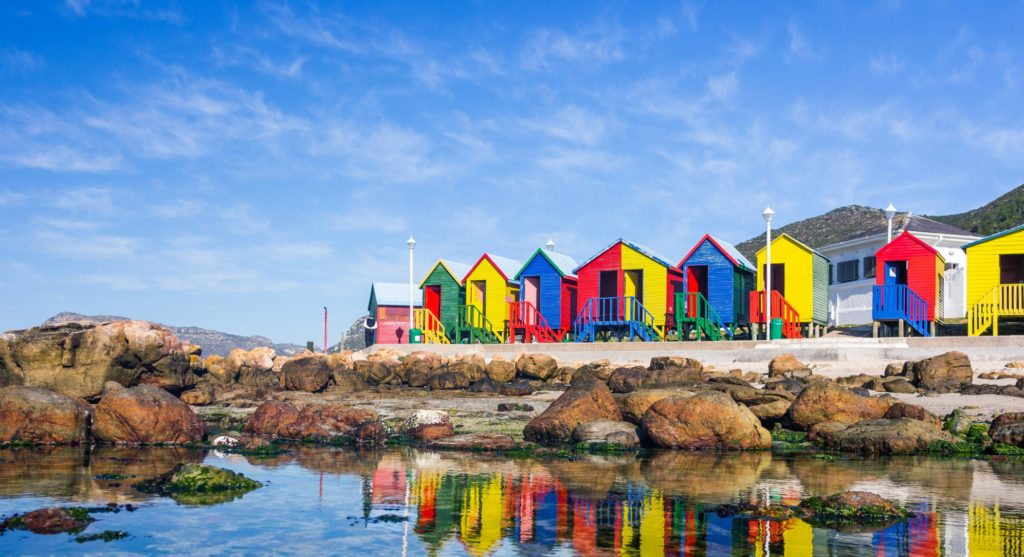
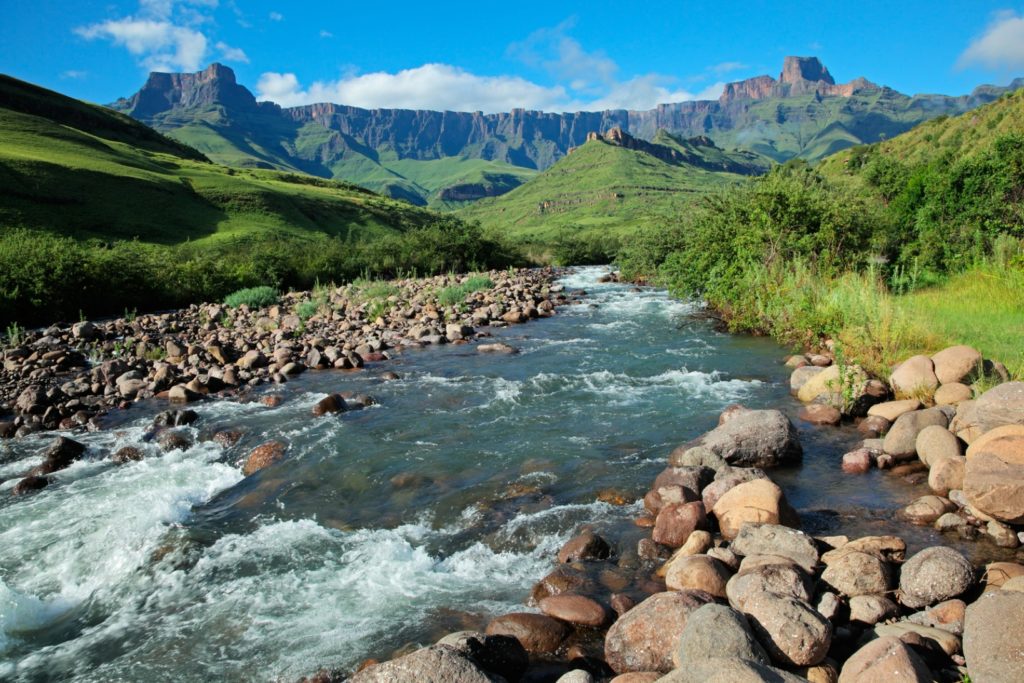
Traveling in Remote Areas: If venturing into remote or rural areas, it’s advisable to inform someone about your travel plans and expected time of return. Carry necessary supplies, including water, food, and a first aid kit, and consider using a reliable GPS or map to navigate unfamiliar routes.
Health Precautions: South Africa has specific health considerations, such as malaria in certain regions. Consult with a healthcare professional before traveling to receive appropriate vaccinations and medications, and follow recommended precautions for mosquito-borne diseases, such as using mosquito repellent and wearing protective clothing.
Scams and Fraud: Exercise caution when dealing with strangers, particularly in busy tourist areas. Be wary of common scams, such as fake tour operators, credit card fraud, or street scams aimed at distracting you. Use reputable tour operators and only provide personal information or credit card details to trusted sources.
Emergency Preparedness: Familiarize yourself with emergency procedures and contact information for local authorities, hospitals, and your country’s embassy or consulate. Keep copies of important documents, such as your passport and travel insurance, and have a plan in place for unexpected situations.
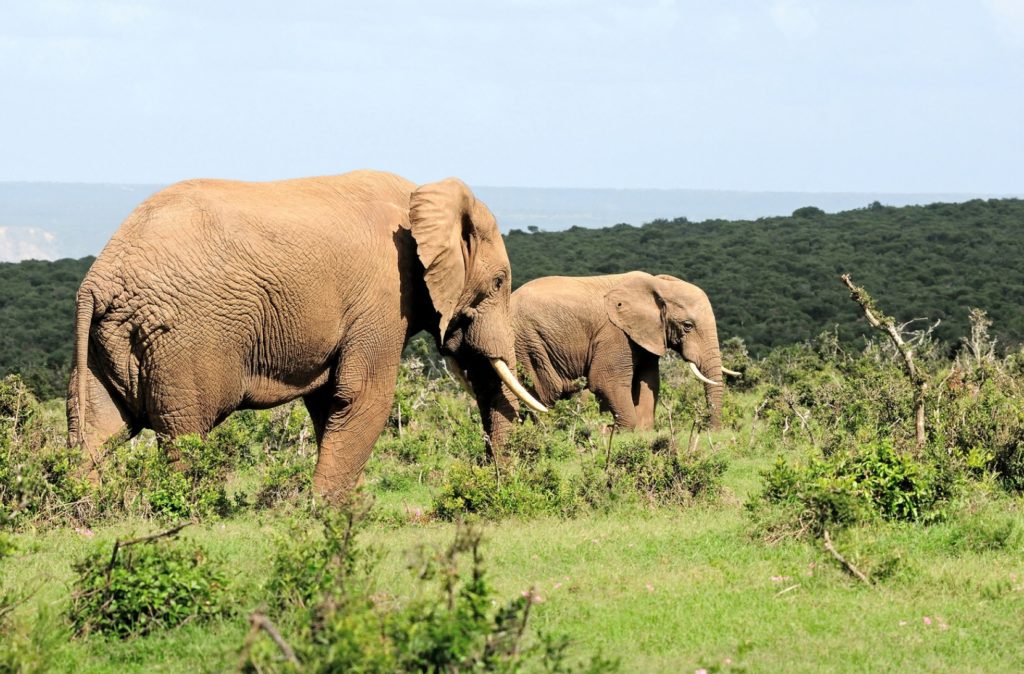
Final travel advice
Electricity and Charging: South Africa uses a 220-240V electrical system. The plugs are three-pronged, with round pins. It’s advisable to bring a universal adapter for your electronic devices to ensure they can be charged.
Cash and Card Payments: South Africa has a well-developed banking system, and credit and debit cards are widely accepted in most establishments, particularly in urban areas. However, it’s recommended to carry some cash, especially for smaller vendors or in remote areas where card acceptance may be limited. ATMs are widely available, and major credit cards are generally accepted.
Cost of Living: The cost of living in South Africa can vary depending on the region and the type of establishment. Generally, South Africa is considered affordable for travelers, particularly when compared to other popular tourist destinations. However, prices for upscale or luxury experiences can be comparable to international standards.
Emergency Numbers: In case of emergencies, dial 10111 for the police, 10177 for an ambulance, and 112 for all emergencies. It’s a good idea to have these numbers saved on your phone or written down for easy access.
Safety Precautions: As with any destination, it’s essential to take basic safety precautions in South Africa. Be aware of your surroundings, particularly in urban areas, and avoid displaying valuable items or walking alone at night in poorly lit or isolated areas. Stay informed about local safety conditions and heed the advice of authorities.
Health and Vaccinations: It’s recommended to consult with a healthcare professional before traveling to South Africa to ensure you are up to date on routine vaccinations and receive any necessary additional vaccines. Malaria is present in certain regions, so if you’re visiting these areas, take appropriate preventive measures, such as anti-malarial medication and mosquito repellent.
Driving and Transportation: South Africa has a good road network, and self-driving can be a convenient way to explore the country. However, be cautious when driving, especially in rural or remote areas, as road conditions may vary. Follow traffic rules and take note of any specific regulations or road signs. Public transportation, such as buses and taxis, is available in urban areas but may vary in terms of reliability and safety.
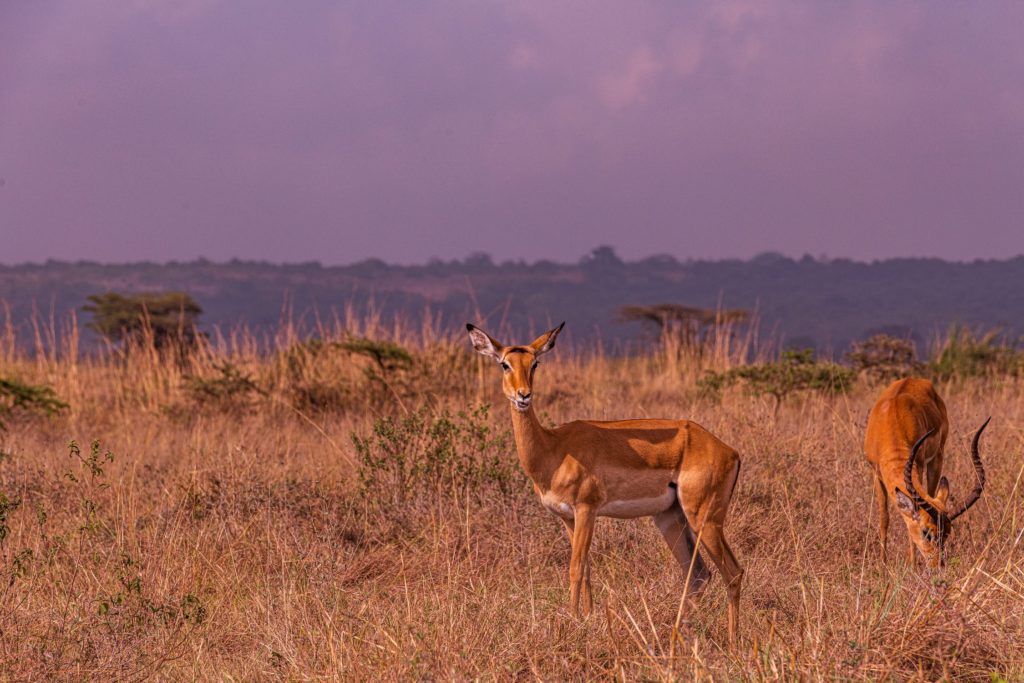
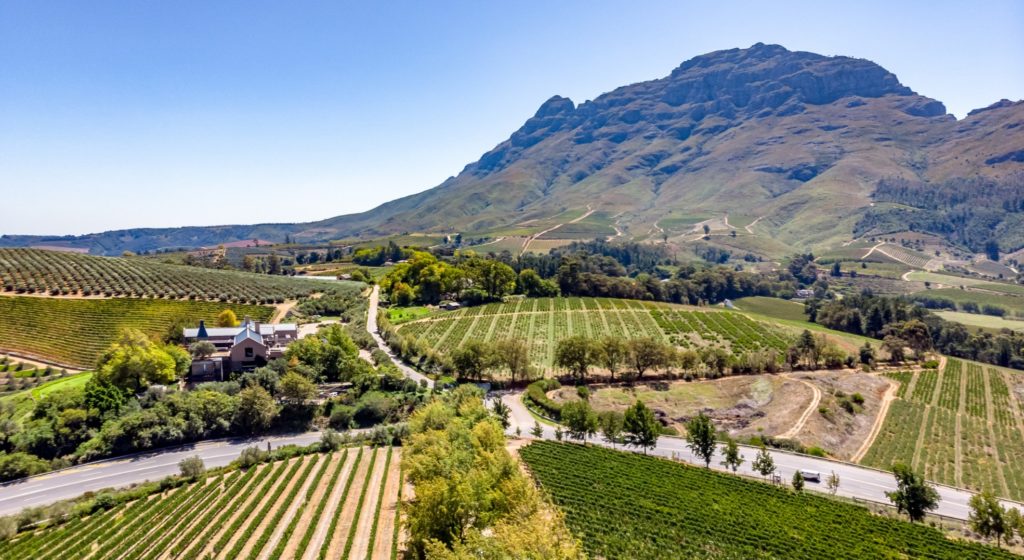
Travel Insurance: It’s highly recommended to have comprehensive travel insurance that covers medical emergencies, trip cancellations, and theft or loss of belongings. Ensure that your insurance policy provides adequate coverage for your specific needs and activities.
Internet and Communication: Wi-Fi is readily available in hotels, restaurants, and cafes in most urban areas. Sim cards for mobile phones are widely available for purchase, and various service providers offer affordable data and voice plans for travelers.
Cultural Sensitivity: South Africa is a diverse country with multiple cultures and traditions. It’s important to respect local customs, traditions, and social norms. Dress modestly when visiting religious sites, ask permission before taking photographs of individuals, and be open to learning about different cultural practices.
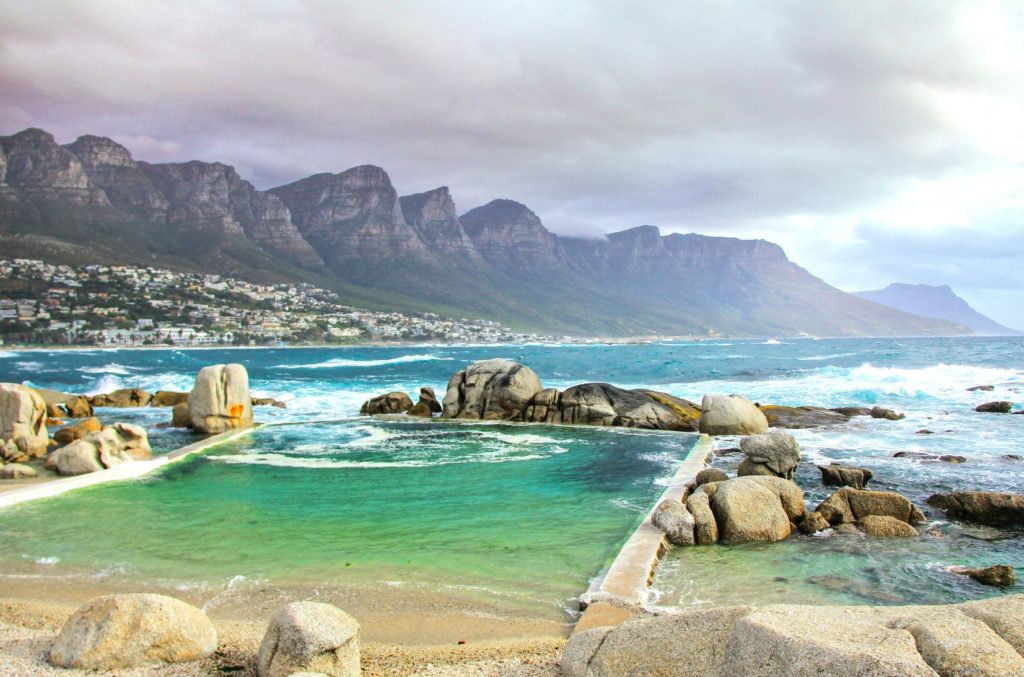
South Africa in movies
“District 9” (2009) – Directed by Neill Blomkamp, this science fiction film was set and shot in Johannesburg. The movie follows the story of an extraterrestrial race forced to live in slum-like conditions on Earth. The talented South African actor Sharlto Copley played the lead role, delivering a captivating performance in this thought-provoking and visually stunning film.
“Blood Diamond” (2006) – Starring Leonardo DiCaprio, Djimon Hounsou, and Jennifer Connelly, this gripping drama was filmed partly in South Africa. Set during the Sierra Leone Civil War, the movie explores the ethical dilemmas surrounding the diamond trade. With its intense performances and breathtaking African landscapes, “Blood Diamond” sheds light on the harsh realities of conflict and exploitation.
“Invictus” (2009) – Directed by Clint Eastwood and starring Morgan Freeman and Matt Damon, “Invictus” tells the inspiring true story of Nelson Mandela’s efforts to unite South Africa through the Rugby World Cup. Shot on location in various South African cities, including Johannesburg and Cape Town, the film captures the spirit of hope and reconciliation that defined the country during that time.
“Tsotsi” (2005) – Directed by Gavin Hood, “Tsotsi” is a critically acclaimed South African film that won the Academy Award for Best Foreign Language Film. Set in the townships of Johannesburg, the movie follows the journey of a young gang leader who experiences a change of heart after a series of events. The cast, largely composed of local actors, delivers powerful performances in this emotionally charged drama.
“Cry, the Beloved Country” (1995) – Based on the classic novel by Alan Paton, this film explores the racial tensions and injustices of apartheid-era South Africa. Starring James Earl Jones and Richard Harris, the story follows a black South African pastor on a journey to find his son in Johannesburg. The film captures the haunting beauty of the South African landscape while delving into themes of love, forgiveness, and social change.
“The Gods Must Be Crazy” (1980) – A South African comedy film directed by Jamie Uys, “The Gods Must Be Crazy” became an international sensation. The story follows the adventures of a Bushman who discovers a Coca-Cola bottle and believes it to be a divine gift. The film’s unique blend of humor, social commentary, and stunning African scenery made it a beloved classic.
“Mandela: Long Walk to Freedom” (2013) – This biographical drama chronicles the life of Nelson Mandela, South Africa’s iconic anti-apartheid leader and former president. Idris Elba delivers a powerful performance as Mandela, capturing the spirit and determination of the renowned statesman. The film showcases significant South African locations and provides an intimate portrayal of Mandela’s personal and political journey.
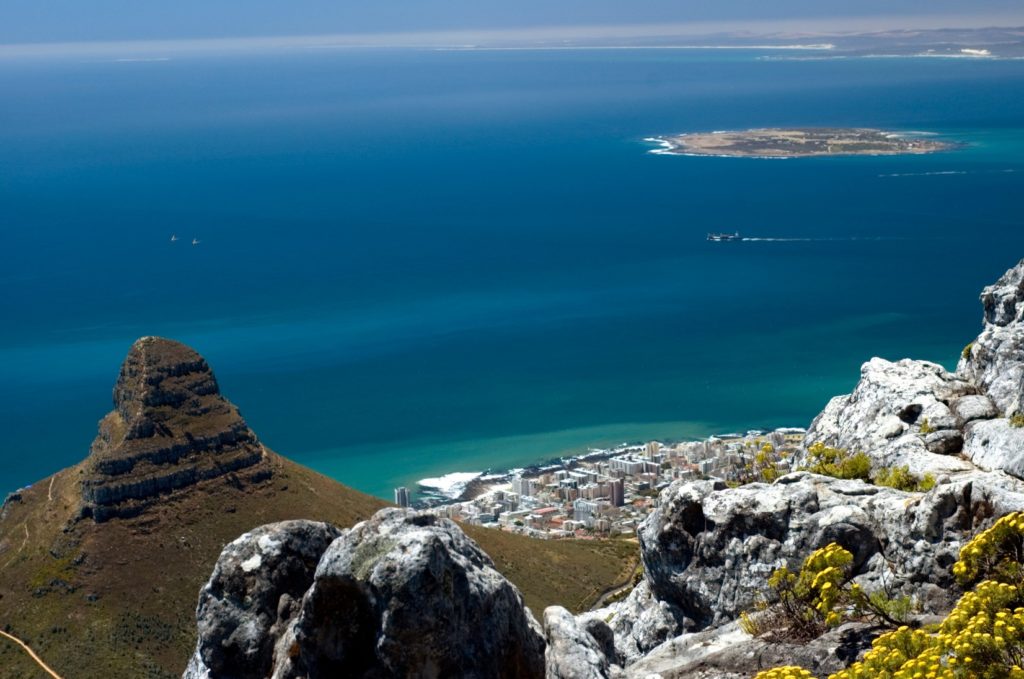
South Africa in books
“Long Walk to Freedom” by Nelson Mandela: This autobiography is a powerful account of Nelson Mandela’s life, detailing his struggles against apartheid and his eventual rise as South Africa’s first democratically elected president. Mandela’s inspiring journey and his commitment to justice and equality make this book a must-read for anyone interested in South African history and Mandela’s personal resilience.
“Disgrace” by J.M. Coetzee: Set in post-apartheid South Africa, this novel by Nobel laureate J.M. Coetzee explores themes of power, race, and personal redemption. The story follows a disgraced Cape Town professor as he navigates the complexities of relationships and confronts the realities of a changing society. Coetzee’s poignant and thought-provoking narrative earned “Disgrace” critical acclaim.
“Cry, the Beloved Country” by Alan Paton: This classic novel is set in the backdrop of apartheid-era South Africa and tells the story of a Zulu pastor who embarks on a journey to Johannesburg to find his son. Alan Paton’s deeply moving exploration of racial inequality and the search for justice has made “Cry, the Beloved Country” a significant literary work with enduring relevance.
“Born a Crime” by Trevor Noah: Comedian and television host Trevor Noah shares his remarkable memoir, recounting his experiences growing up as a mixed-race child during apartheid in South Africa. Through humor and candor, Noah reflects on the complexities of identity, racism, and resilience, offering a unique and personal perspective on South African society.
“The Power of One” by Bryce Courtenay: Set against the backdrop of World War II and apartheid, this coming-of-age novel follows the life of a young English boy growing up in South Africa. As he faces personal and societal challenges, the protagonist discovers the power of determination, friendship, and the fight against injustice. Bryce Courtenay’s captivating storytelling immerses readers in the rich tapestry of South Africa’s history.
“Spud” by John van de Ruit: This humorous and heartfelt novel is set in a prestigious South African boarding school during the early 1990s. Through the eyes of the titular character, John “Spud” Milton, readers experience the joys and challenges of adolescence, friendship, and navigating the complexities of a changing society. The book offers a lighthearted yet insightful perspective on South African youth culture.
“Master Harold…and the Boys” by Athol Fugard: Set in 1950s Port Elizabeth, this play by renowned South African playwright Athol Fugard explores themes of racism, friendship, and the impact of apartheid. The story revolves around the relationship between a white teenager and two black waiters, delving into the complexities of South Africa’s racial dynamics and the destructive effects of prejudice.
See our Johannesburg Travel Guide
See our Cape Town Travel Guide